Vuelta a España: Monster Hydro rider of the day
Roglič gives Jumbo-Visma its first Grand Tour victory in Madrid

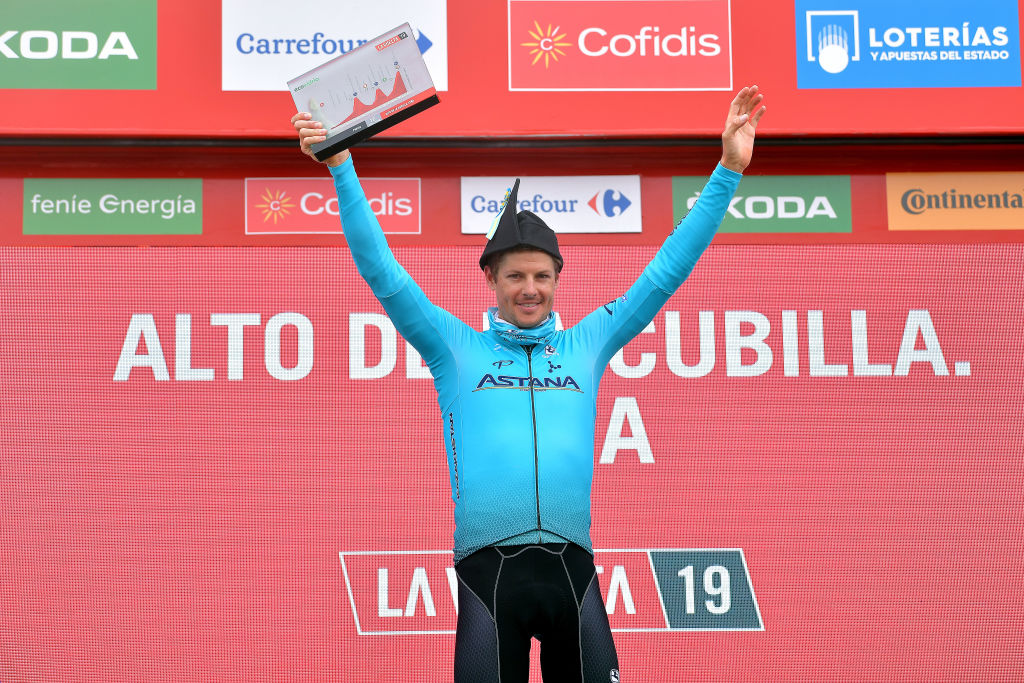
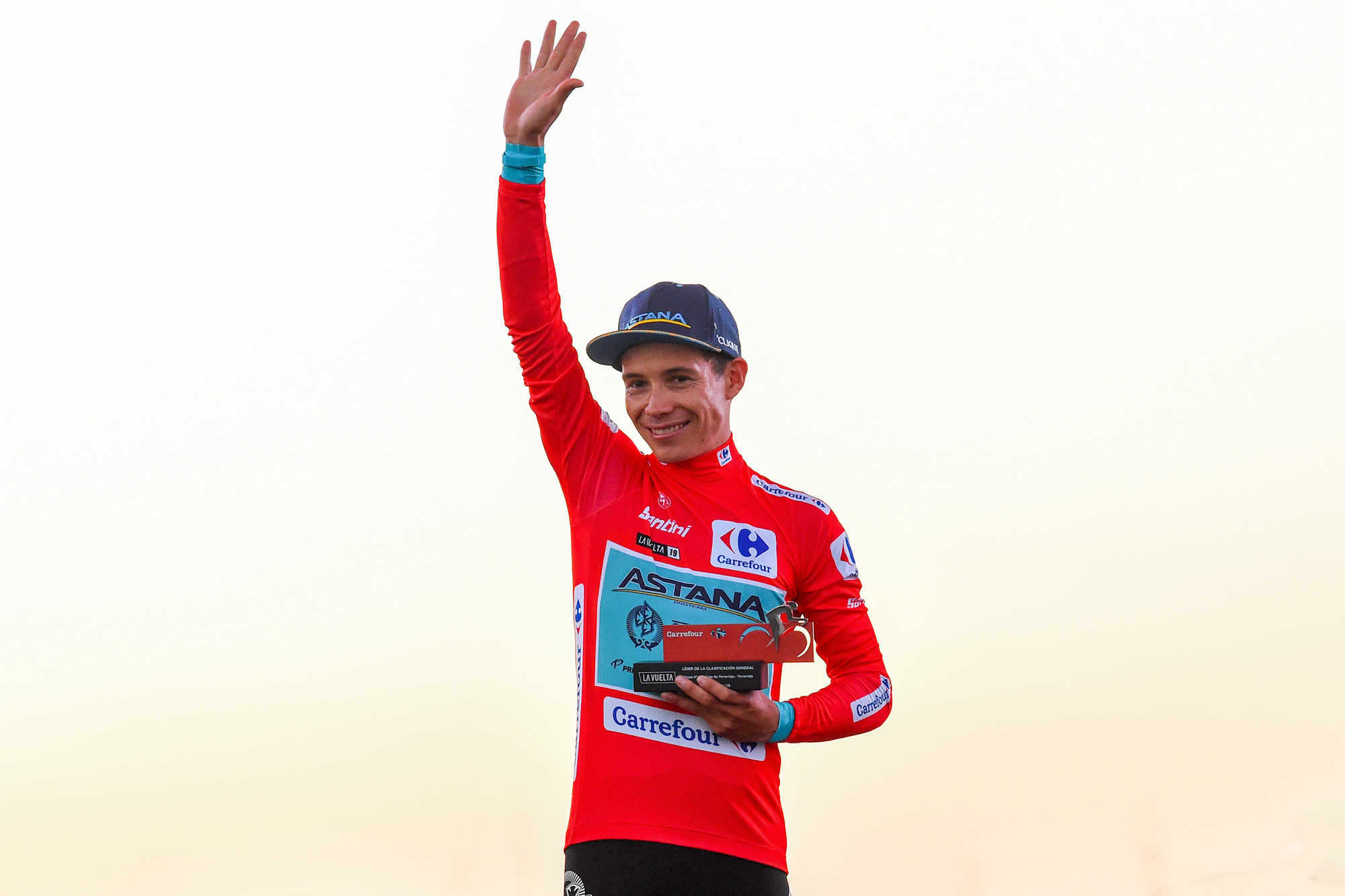
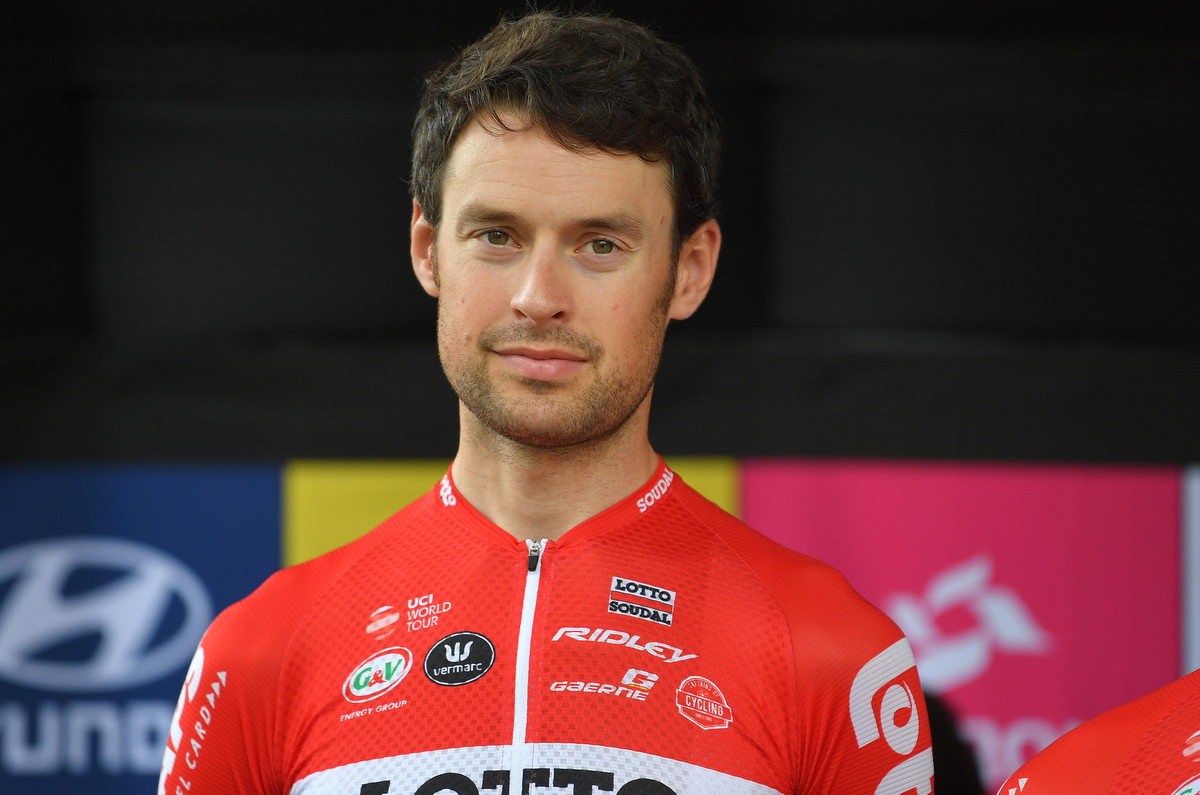
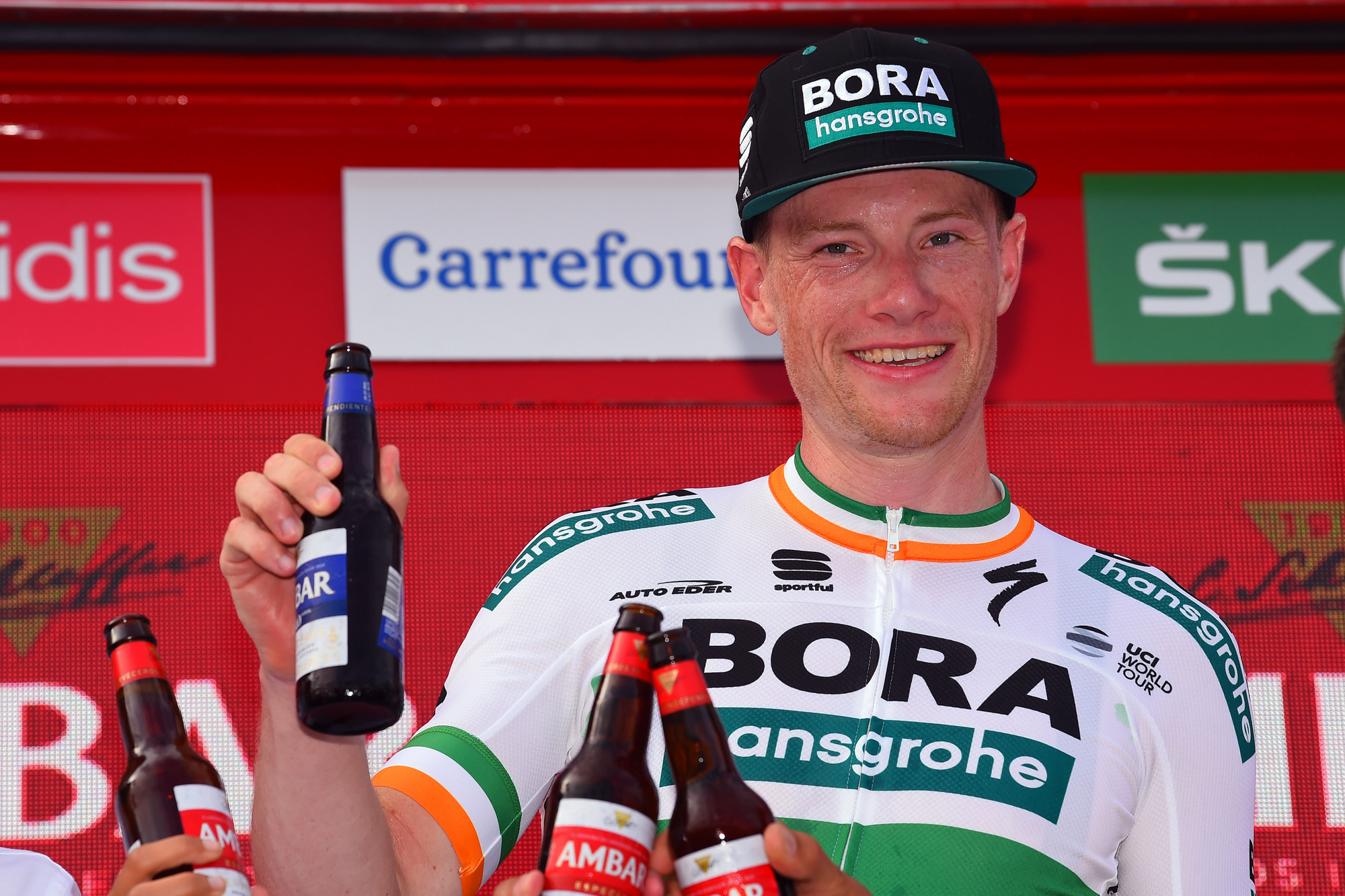
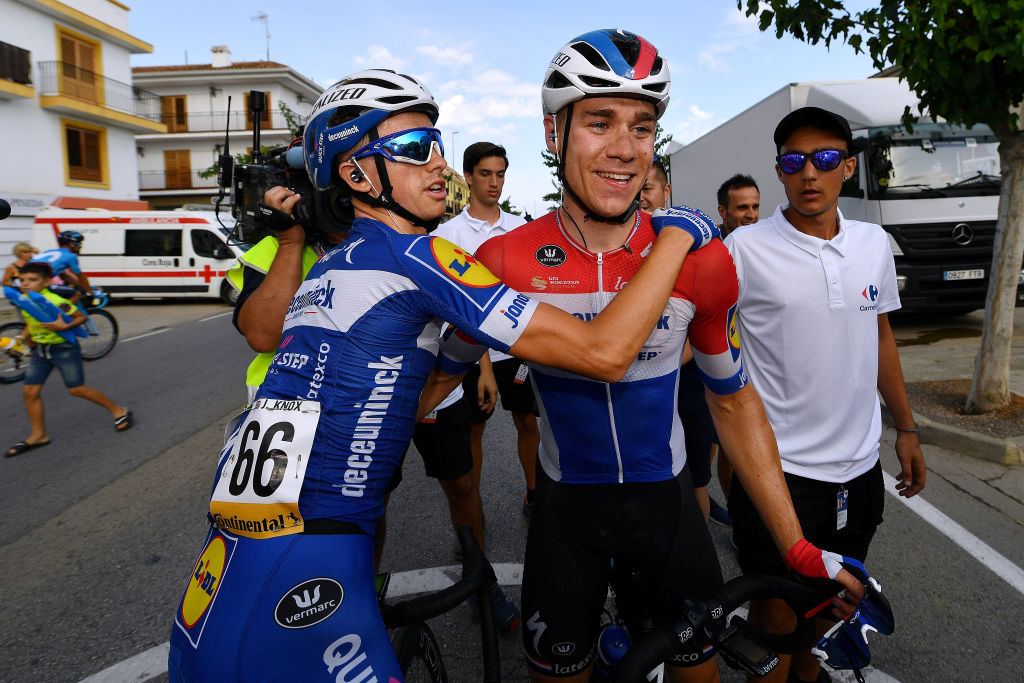
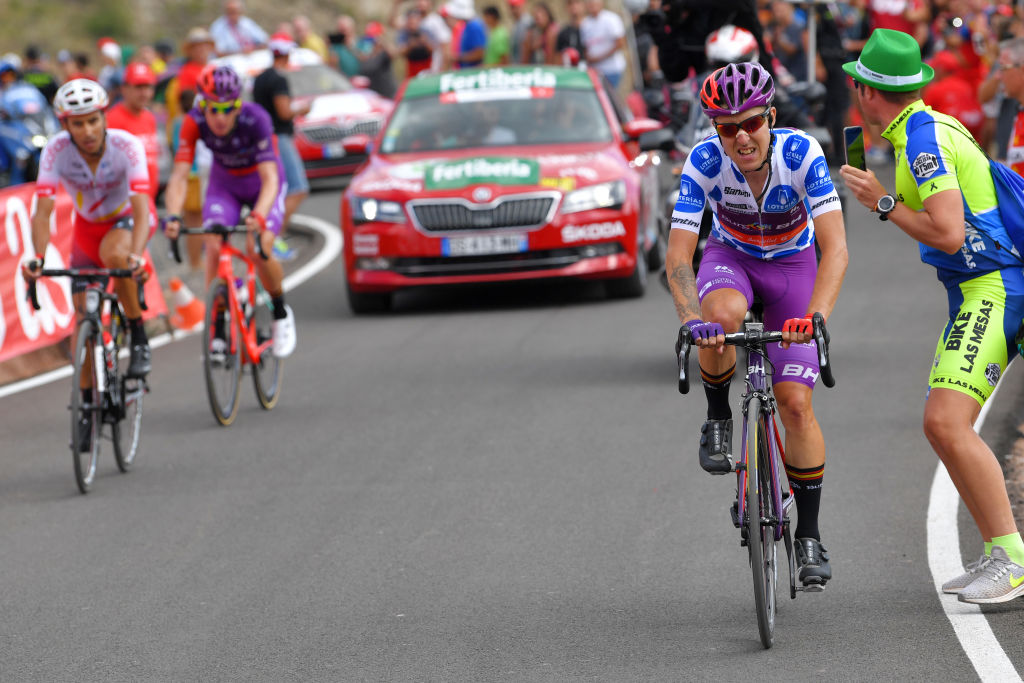
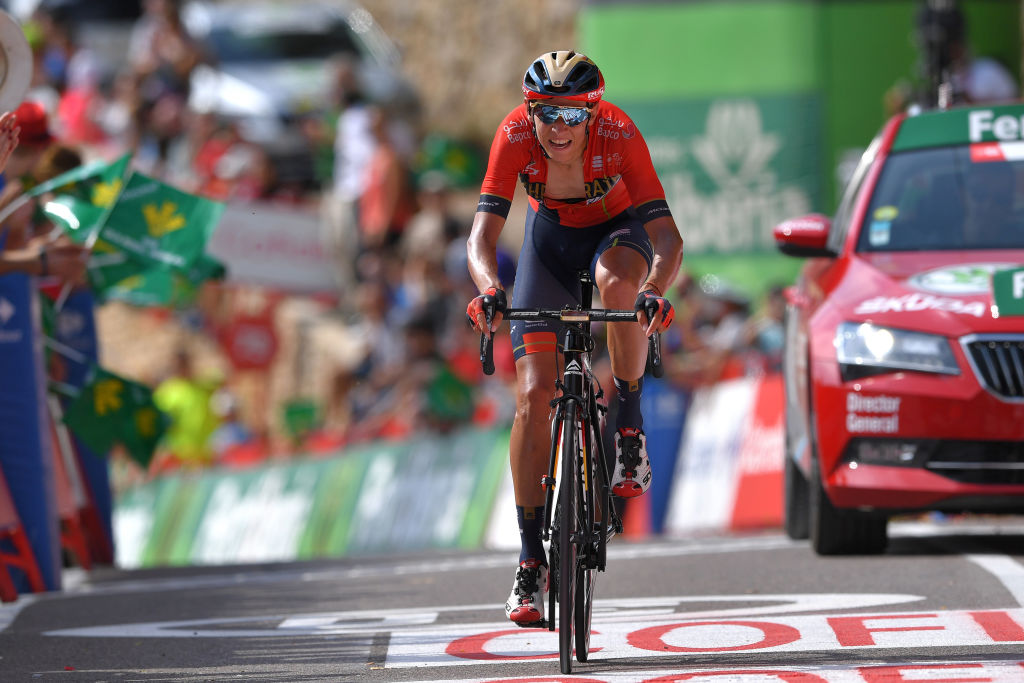
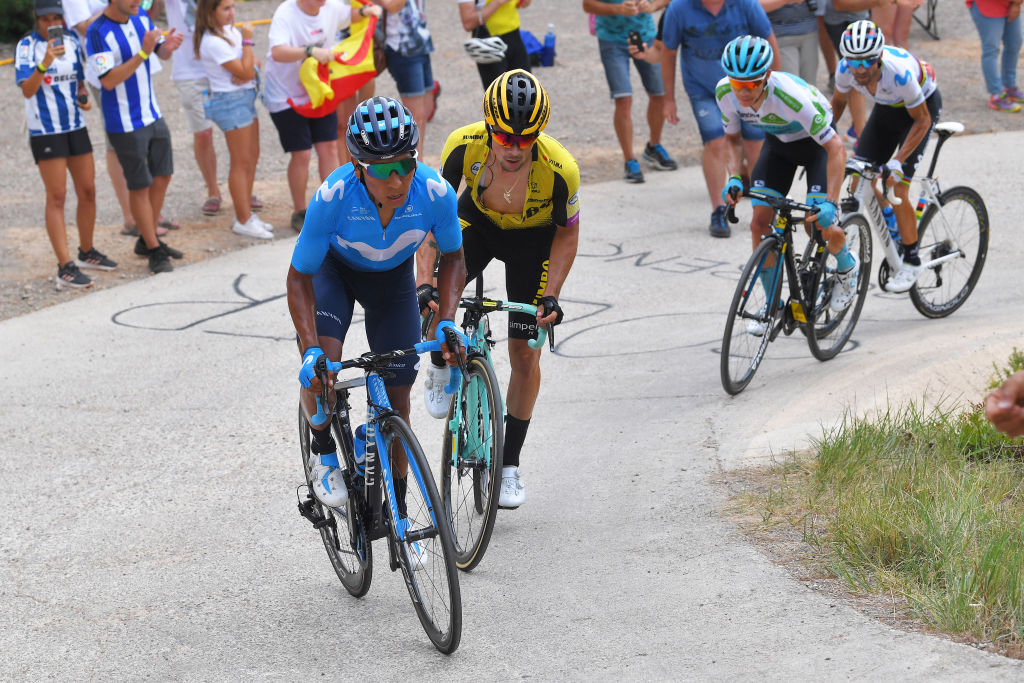
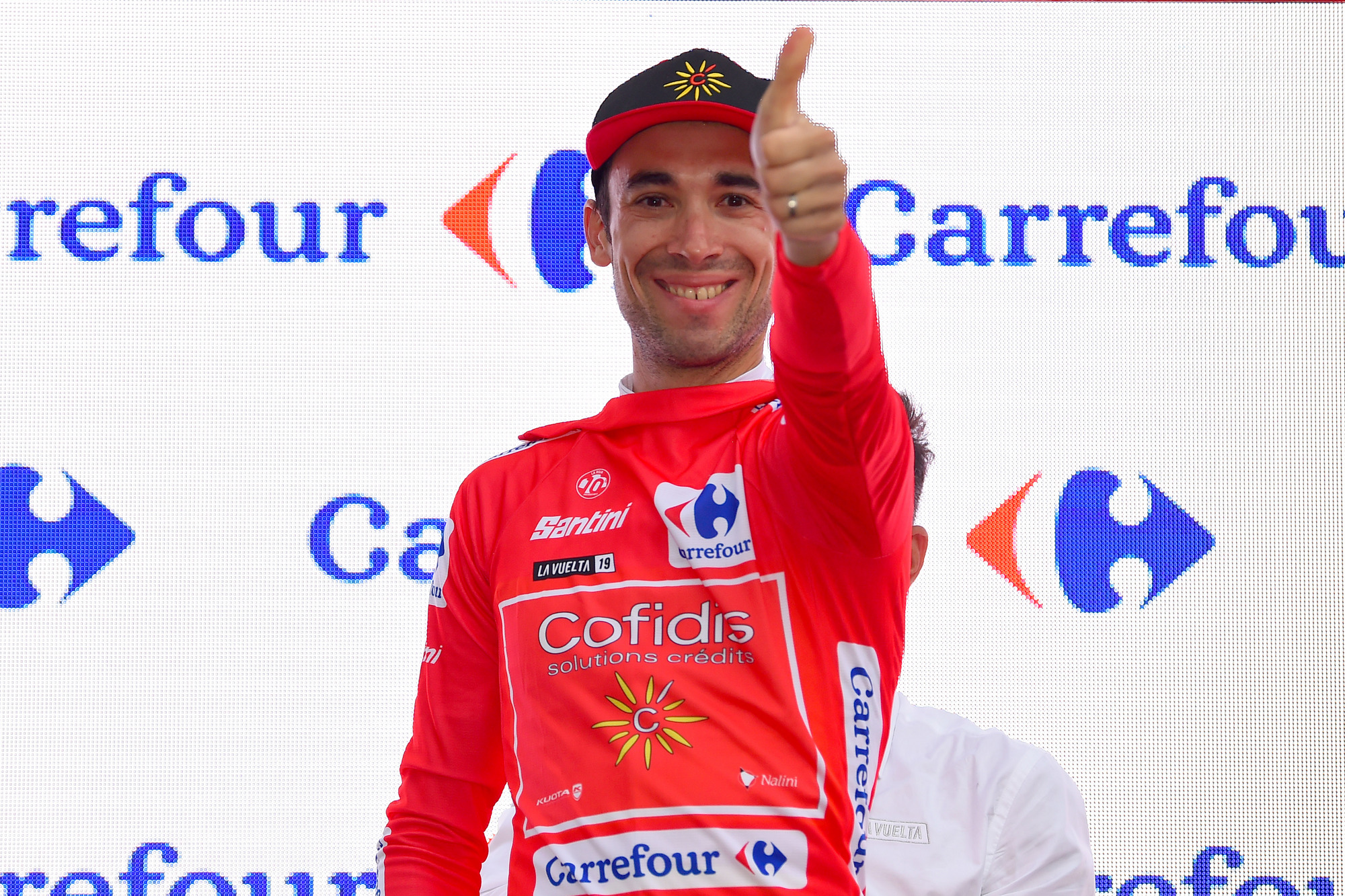
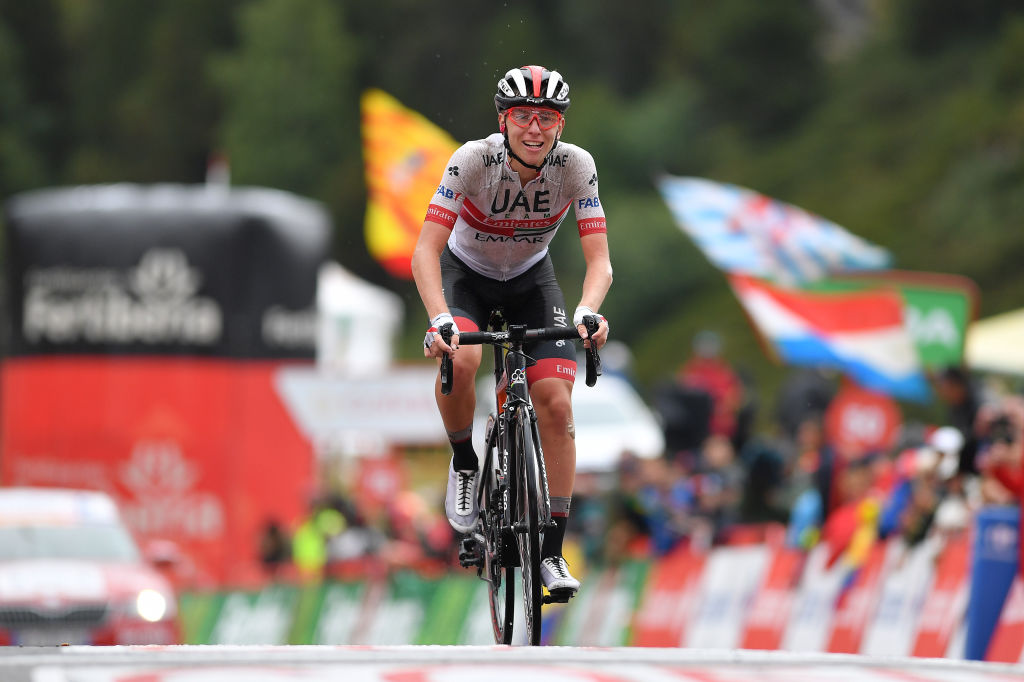
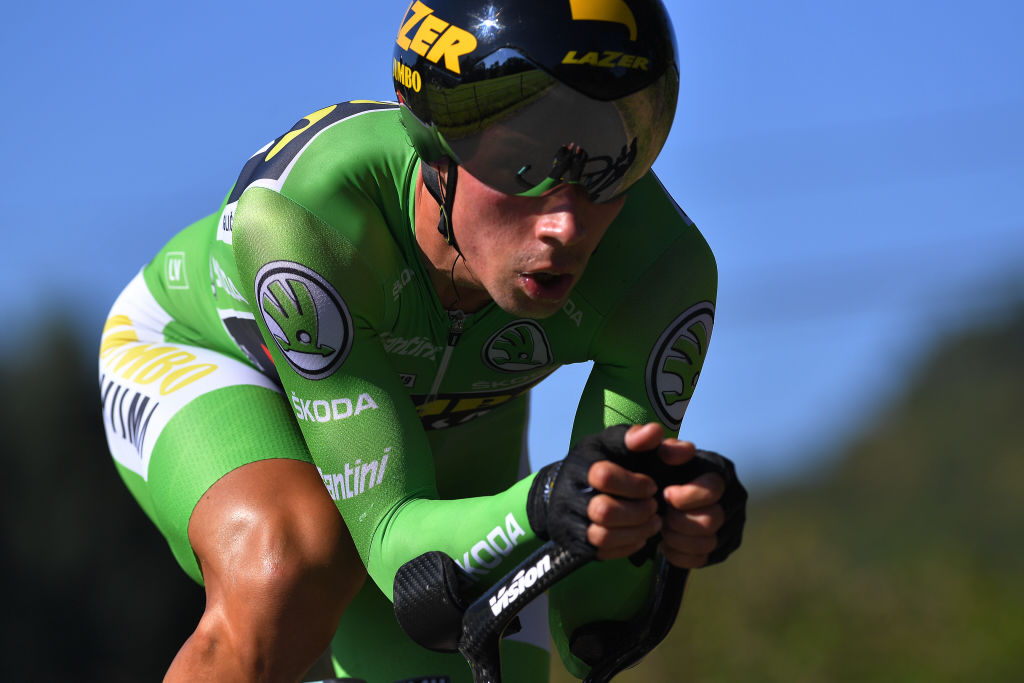
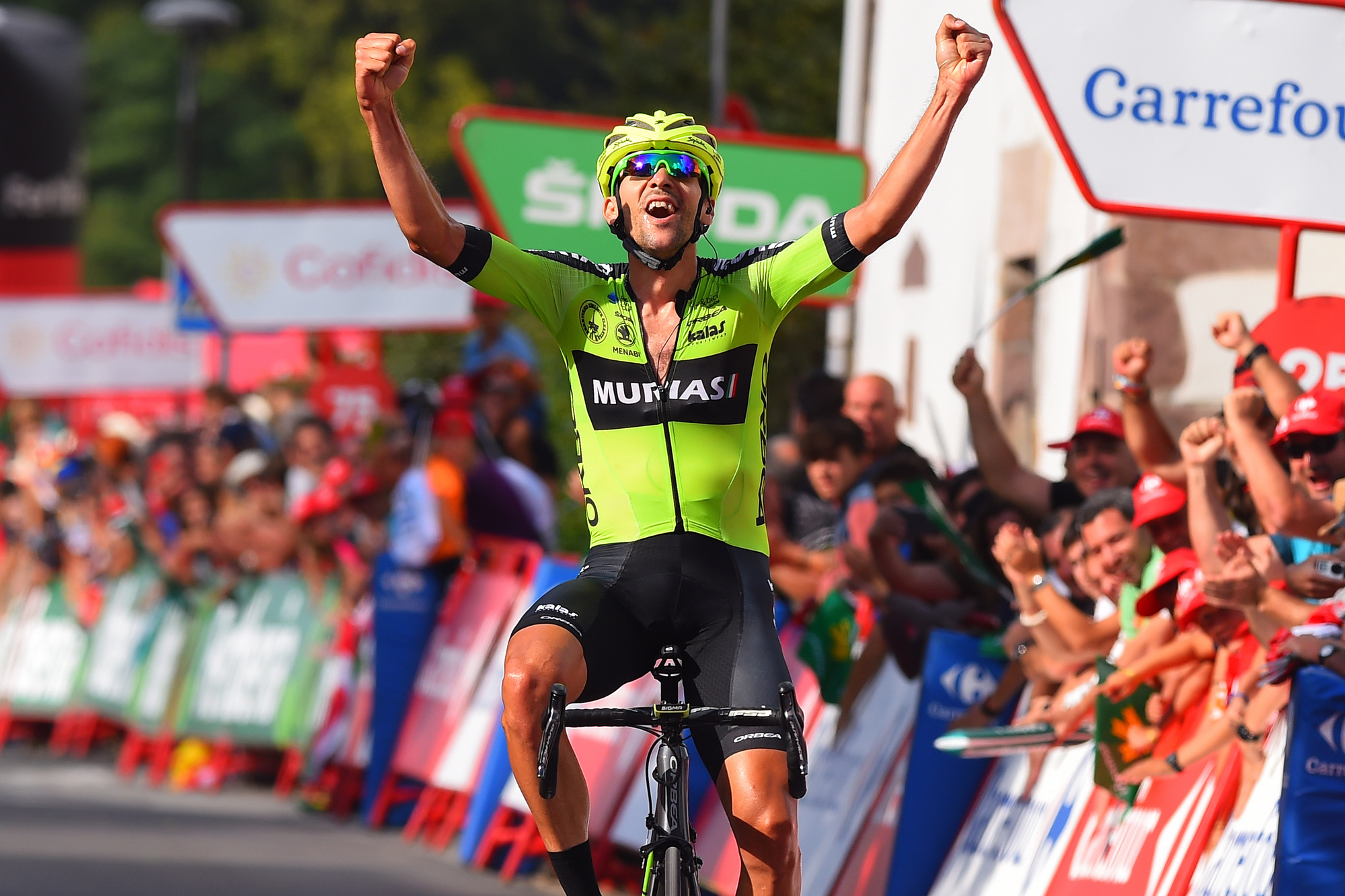
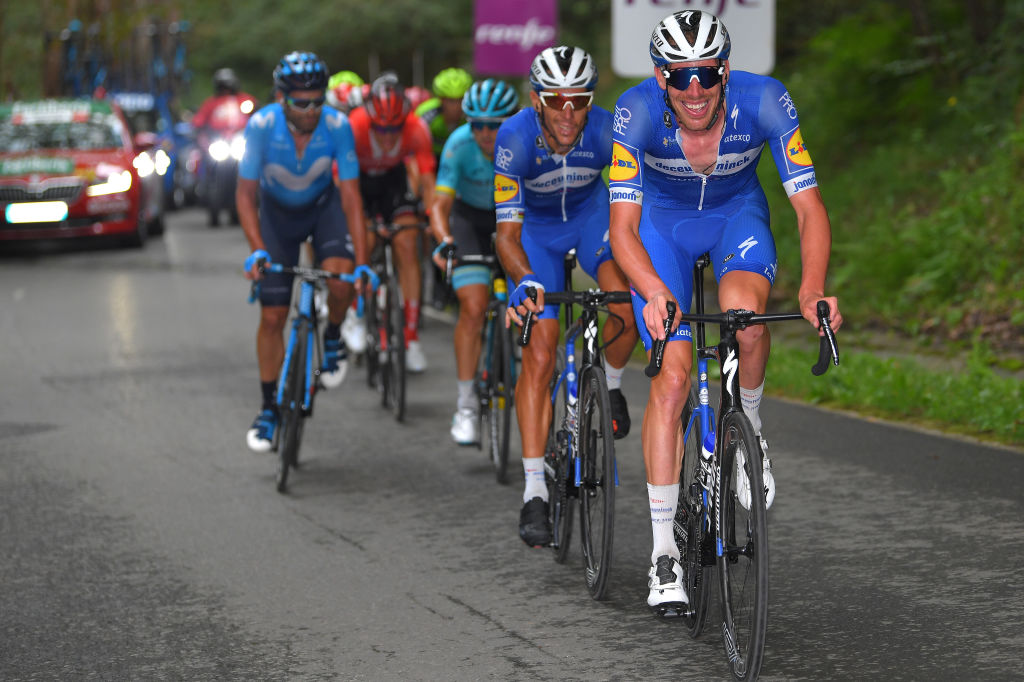
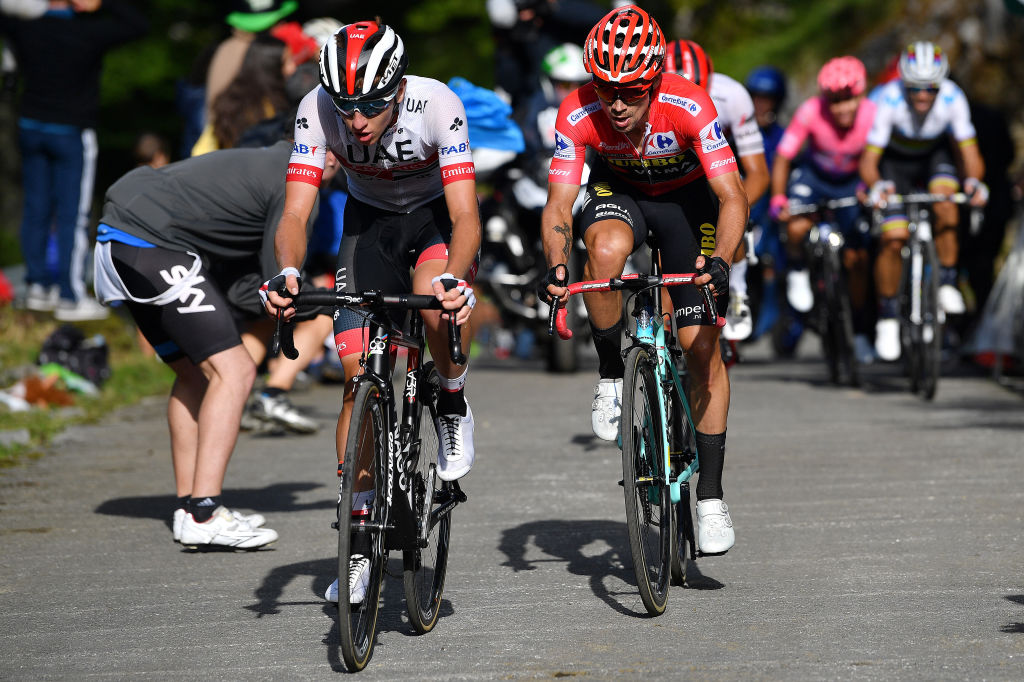
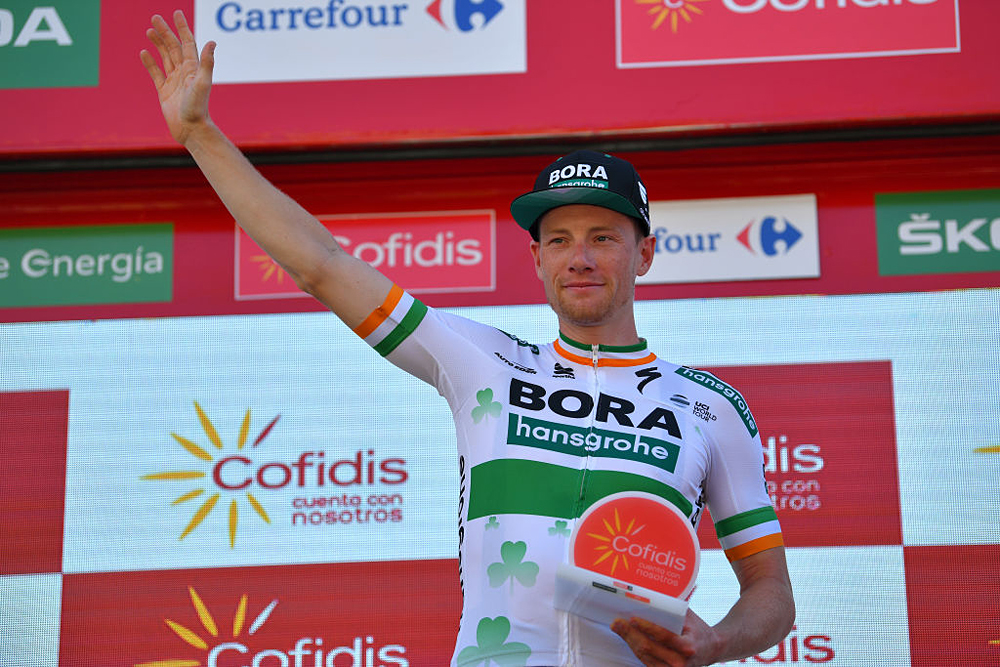

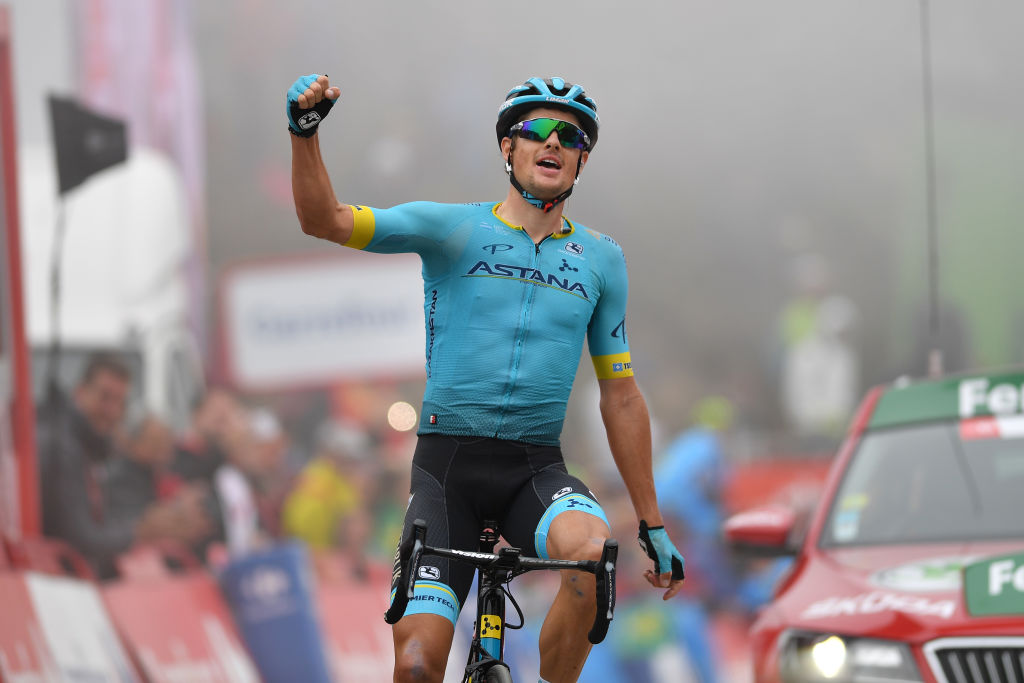
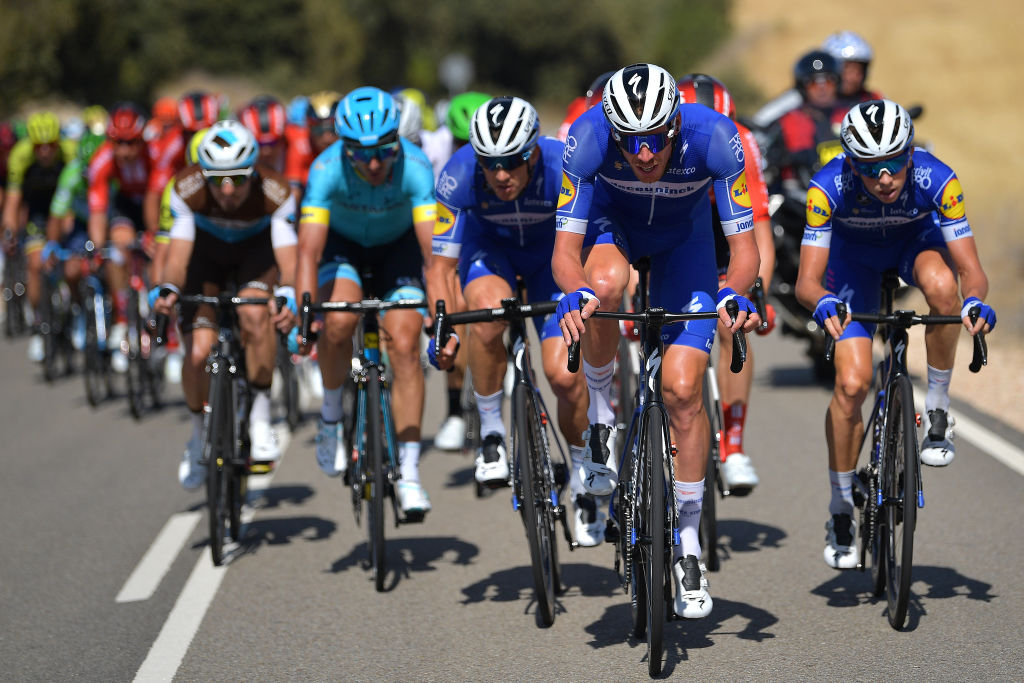
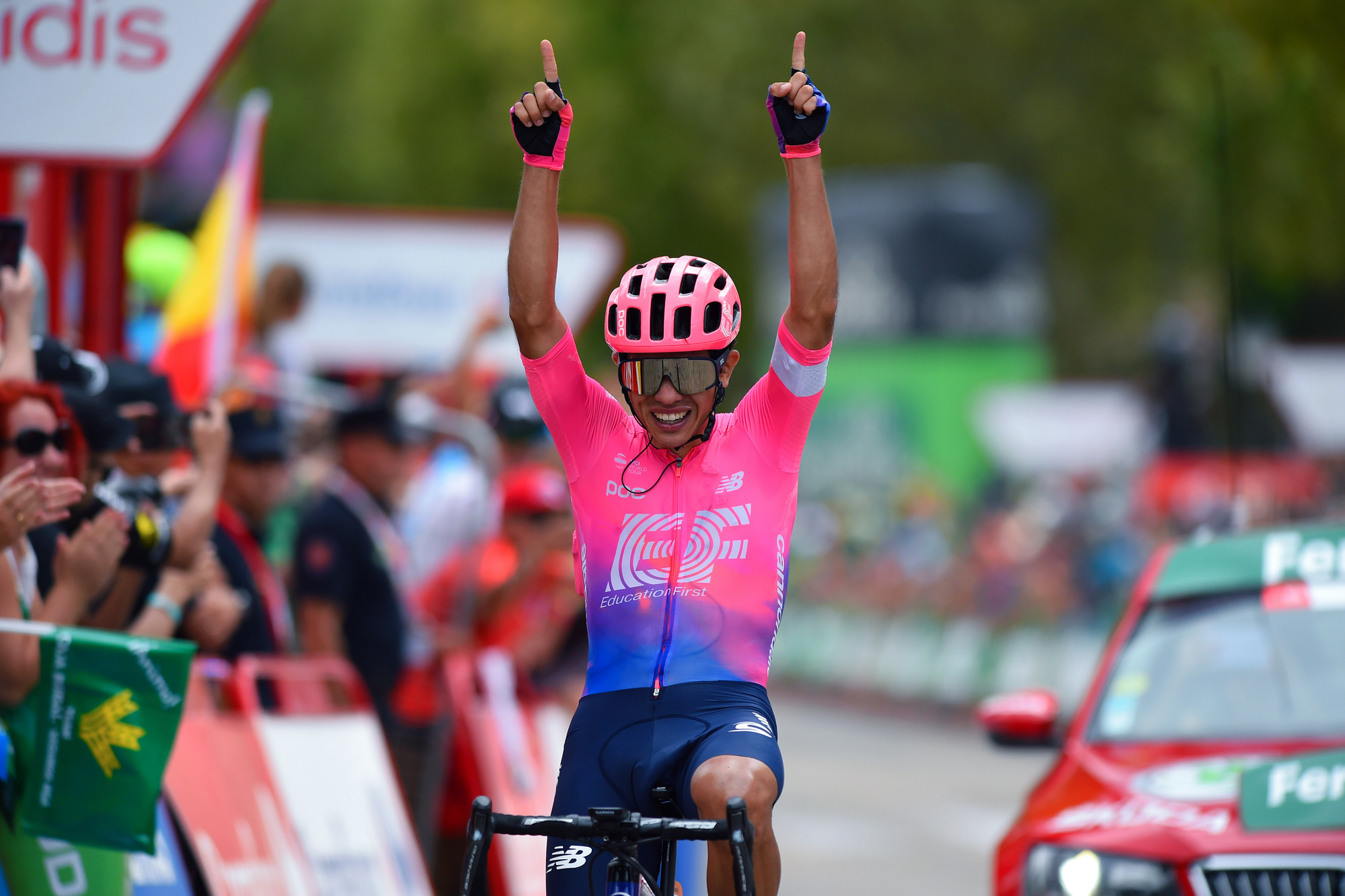
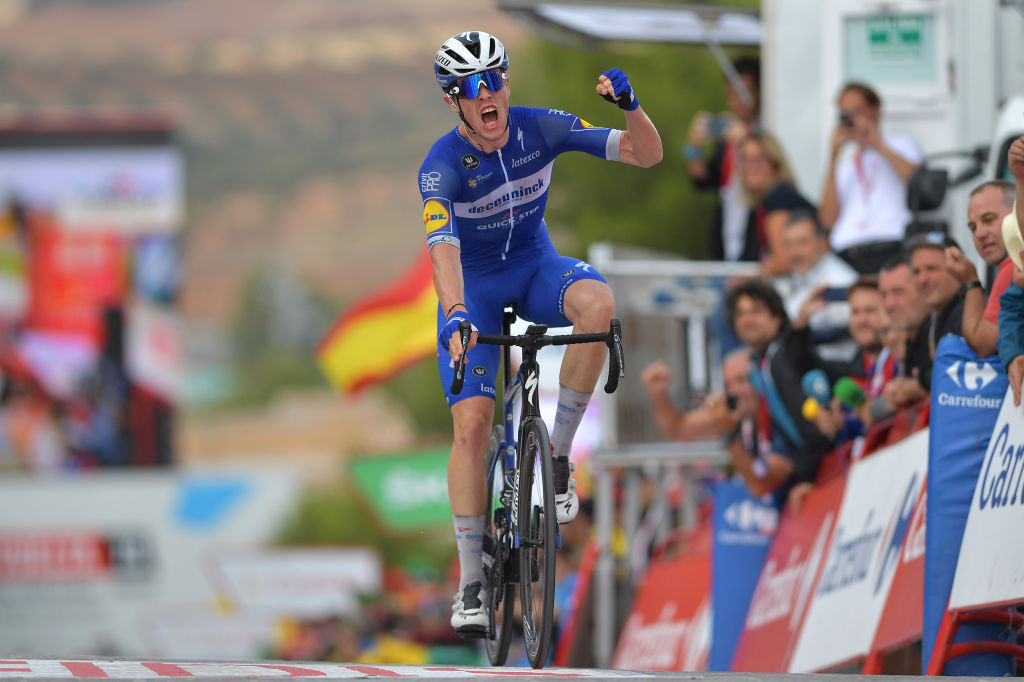
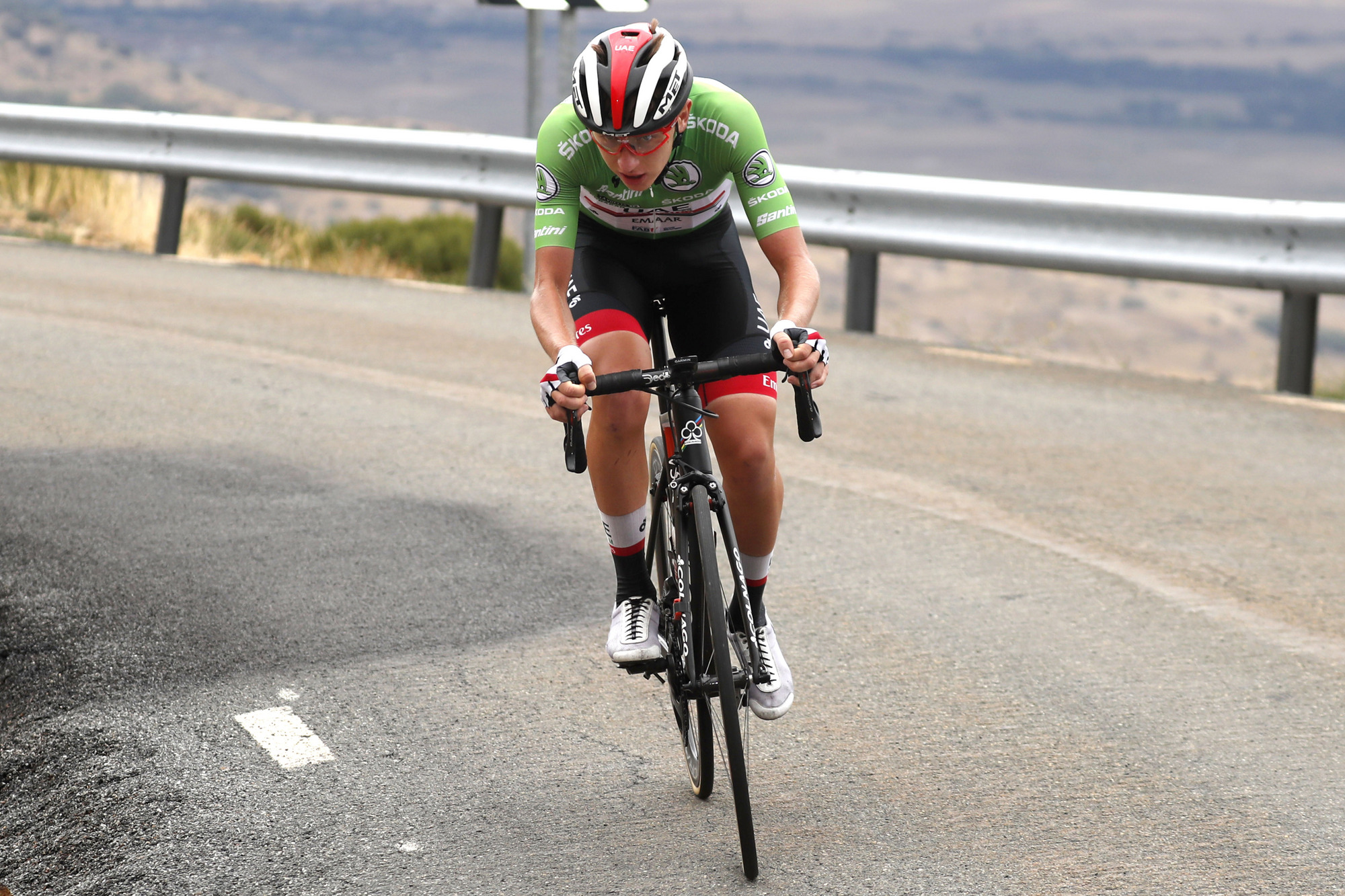
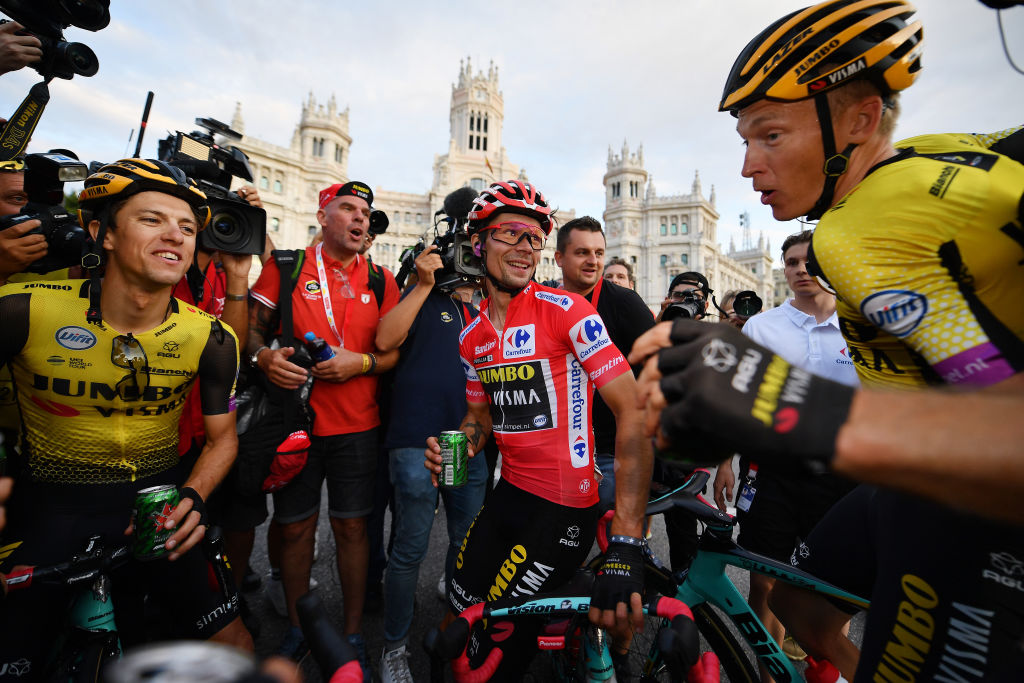
With apologies to Fabio Jakobsen, who scooped his second stage win of the Vuelta a España as the race concluded in Madrid, the race's final day was mostly about Primož Roglič, who wrapped his first victory in a Grand Tour.
After a stuttering start for the Slovene and his Jumbo-Visma team in the opening team time trial in Torrevieja, where several of their riders crashed and the Dutch team finished a confidence-denting 18th, Roglič barely put a foot wrong for the next three weeks and ended up a comfortable winner of Spain's national tour.
Some may point to the fact that his only stage win was in the mid-race time trial in Pau and highlight the fact that he was largely overshadowed by young compatriot Tadej Pogačar in the mountains, but Roglič was consistency personified. When it mattered, he matched or bettered his rivals on the climbs, revealing no chinks in his armour that they might be able to exploit.
Even when the Slovene did find himself in a difficult situation, most obviously when isolated from his teammates on the windswept stage into Guadalajara, he kept his cool and managed the challenge with aplomb. As a result, he reached Madrid with an advantage of two-and-a-half minutes on his nearest rival, an impressive lead in the modern era when three-week races are often decided by seconds.
His team should receive a lot of credit, too. They lost Steven Kruiswijk, a key support rider in the mountains, very early on, but remained in control of the GC contest almost throughout.
Analysis: The time trial was the key stage for Roglič. Sandwiched between Colombians Nairo Quintana and Miguel Ángel López going into it, he put three minutes in the former and two into the latter. Although the first half of the race had suggested that the Colombian pair would strike back on the summits that followed, Roglič eclipsed them both.
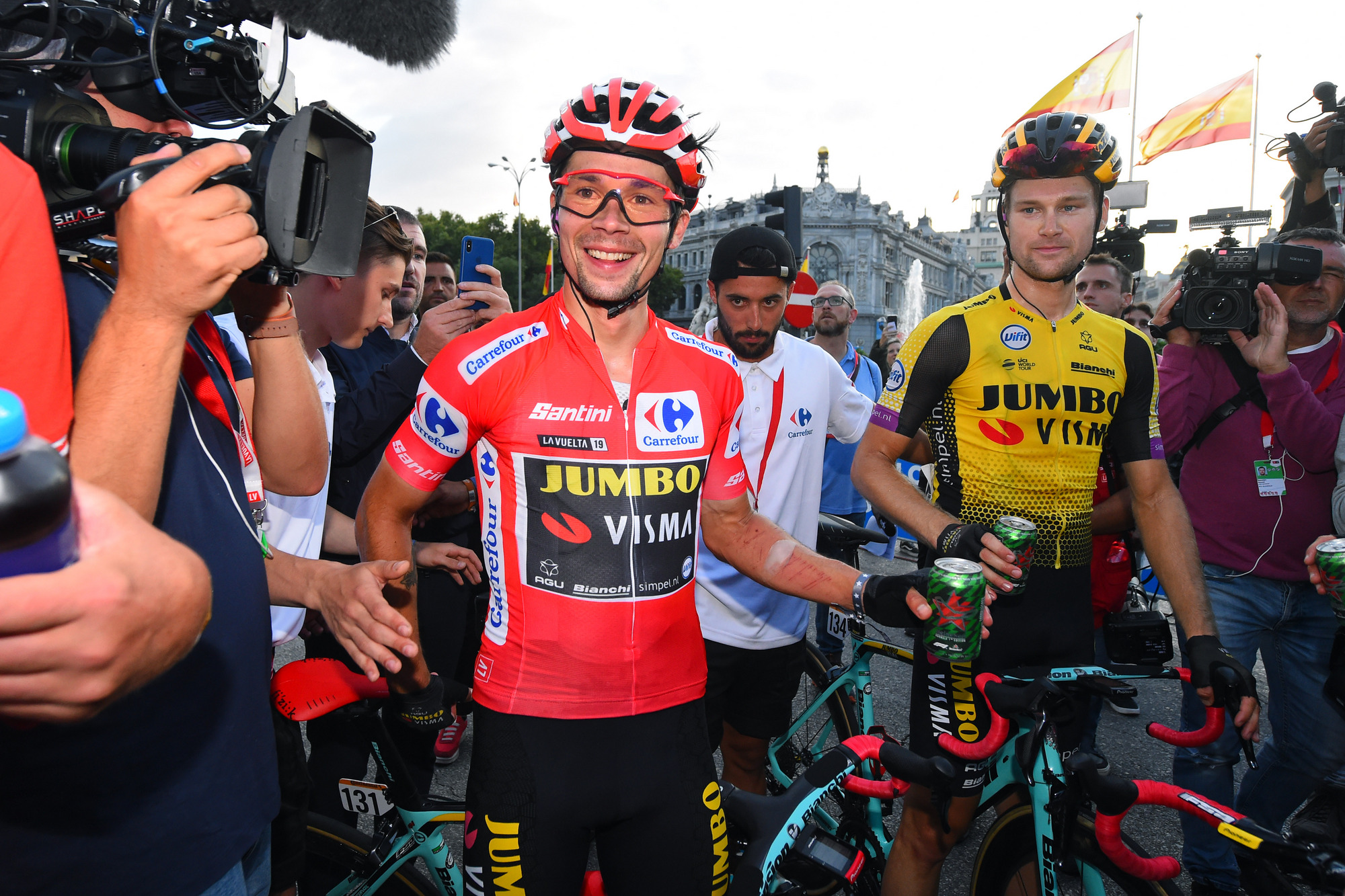
Pogačar astonishes with triple success at Plataforma de Gredos
It's astonishing when any rider wins three of the key summit finishes in a Grand Tour, but doubly so when that rider is making their debut in a three-week race and is only 20 years old. In not only winning the final mountain stage of the 2019 Vuelta a España, but also securing third place on the podium and the white jersey of best young rider, Tadej Pogačar was unquestionably the rider of the day.
The latest race content, interviews, features, reviews and expert buying guides, direct to your inbox!
When he attacked from the red jersey group with half a dozen kilometres left of the penultimate climb, the Peña Negra, the young Slovene quickly opened up a gap on his rivals, who looked at each other wondering who was going to chase.
The speed of Pogačar's attack was underlined when he breezed across the gap to the two surviving members of the break, Ruben Guerreiro and Tao Geoghegan-Hart, and his commitment to gaining as much time as possible was immediately highlighted when he immediately rode both of them off his wheel.
There were obvious parallels with the attack that Egan Bernal made on the Iseran stage of the Tour de France which carried the Colombian into the yellow jersey. Like Bernal, Pogačar attacked a long way from the finish, so far out that it appeared rash in the modern era when most Grand Tour favorites tend to wait as long as possible before hitting out on their own.
Perhaps it was partly down to the exuberance of youth, but above all it illustrated the confidence both have in their ability and how extraordinary their talent is.
Pogačar's offensive was made all the more impressive by the fact that he looked like he'd been tiring in recent days. Today, though, there was no sign of fatigue. While his rivals dithered, he kept pressing.
As he started up the final 9km to the finish, it was no longer a question of whether he would win, but how much time he would gain on the other podium contenders. It was, quite simply, a phenomenal performance.
Analysis: Having attacked on a climb and bridged up to a small group ahead, most riders would have collaborated with those riders in order to recuperate a little and perhaps even push their advantage out a little further.
Pogačar, though, is not most riders. Although, after two stage wins and with a high GC finish confirmed, he had little to lose, the precocious Slovene opted to press on because he believed it was his best chance to make a significant gain. It was an audacious tactic that fully merited his ultimate reward.
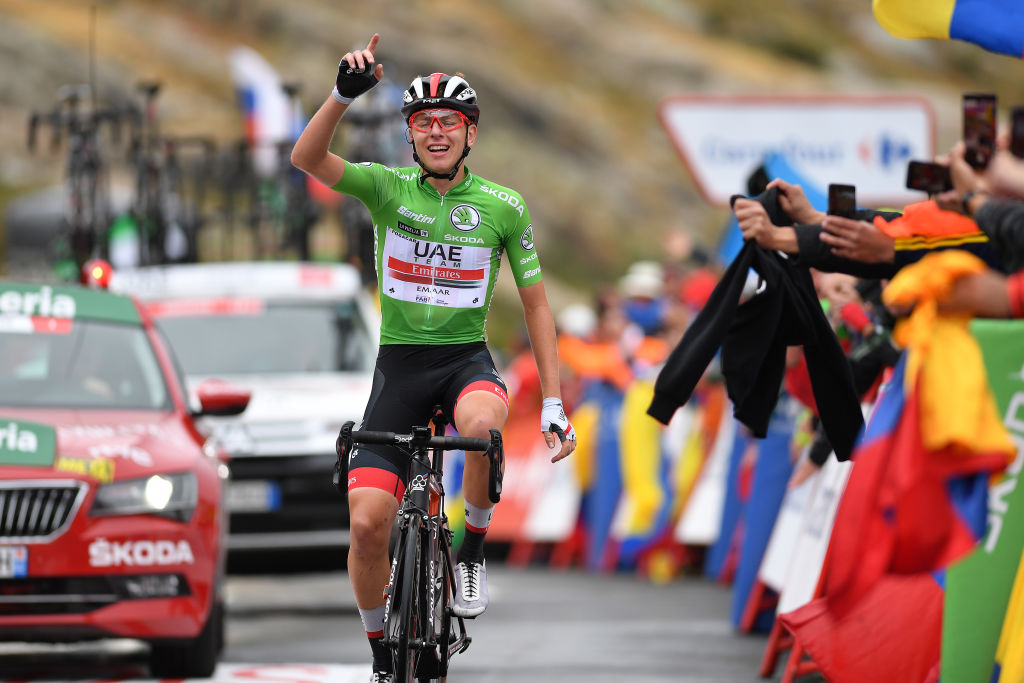
Cavagna defies the wind and the peloton in Toledo
Rémi Cavagna's first Grand Tour stage win bore many of the hallmarks of the solo success pulled off by Sergio Higuita 24 hours earlier at the Vuelta a España. Like the Colombian, the Deceuninck-QuickStep man never had much of an advantage over the riders chasing him and looked like he'd get caught on several occasions.
But, drawing on the time trialling ability that carried him to third place in the Pau test earlier in the race, the 23-year-old Frenchman hung on to take a courageous victory.
Cavagna has been a regular presence at the front of this race, not least on the high-speed stage into Guadalajara two days ago, when he played a significant role in helping teammate Philippe Gilbert to victory.
Today, he was one of an 11-man group that went clear after just 4km, their advantage hovering for a long time at around two to three minutes, but little more than a minute when Cavagna accelerated off the front of the pace line with 25km remaining.
It looked a doomed effort because he was riding into a headwind ahead of a group that was still working well together. For the next few kilometres his lead edged out very slowly. When he started a long and very rolling loop around Toledo, his gap was 40 seconds. With 2km to go, he still had 30 seconds in hand as the peloton swept up the other escapees.
On a flat finish that would have been more than enough to hold on, but on the rise up into the old city of Toledo, the last 700 metres on a cobbled road, Cavagna did superbly well to manage his advantage. As he crossed the line, Bora-Hansgrohe sprinter Sam Bennett was almost on his heels, but Cavagna had judged his effort perfectly.
Analysis: With 30km to go there was an intriguing incident in the peloton chasing the breakaway group. Cavagna's Deceuninck-QuickStep teammate Tim Declercq was prominent among the pace-setters, but got a message in his earpiece to stop contributing. Within a couple of kilometres, Cavagna had attacked from the break.
QuickStep clearly decided to allow the Frenchman his chance, knowing they had Philippe Gilbert and Zdenek Štybar as strong options if the race did come back together. Given an opportunity, Cavagna grabbed it.
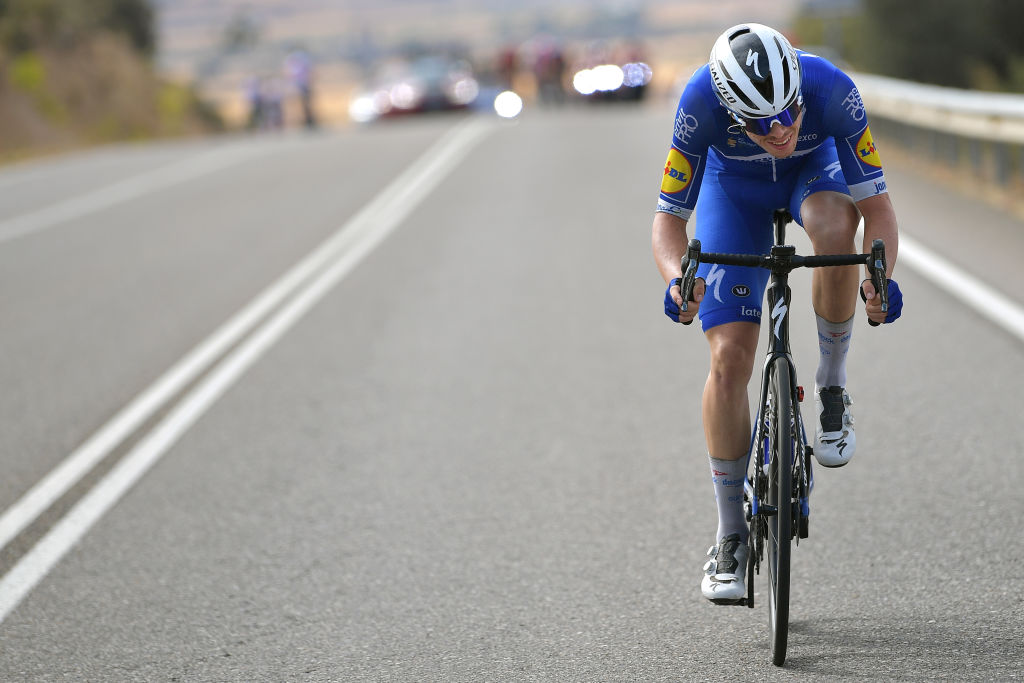
Stage 18 – Higuita's aggressive approach pays dividends in Madrid sierra
Given the aggressive way in which Sergio Higuita (EF Education First) races, it's surprising that he hadn't won a pro race before he claimed victory in such dashing fashion on stage 18 of the Vuelta a España on Thursday through the mountains to the north of Madrid.
The 22-year-old Colombian was active from early on in the stage, attacking on the descent off the first ascent of the Puerto de Navacerrada and providing a huge amount of impetus to the break beyond that point.
When, on the third of the stage's four big climbs, Miguel Ángel López attacked and got to within a minute of the escapees, Higuita realized the GC favorites were likely to respond and pushed hard again, this time on his own.
Many aspects of his 50-kilometre solo ride to victory impressed. Above all, though, his determination to maintain a cushion over the GC favourites was fundamental. His advantage was never large, no more than 90 seconds at any point, but he took full advantage in the lulls in the GC battle, particularly coming into and on the Puerto de Cotos, the final climb of the day.
Coming off it, it was thrilling to watch him in full flight. Here was a rider announcing himself to the cycling world in the very best way.
In the final kilometres running slightly uphill, he couldn't afford to relax, but somehow he managed to keep the chasers at bay. Higuita already looked a class act. Now his EF Education First team know they've unearthed a true diamond of a rider.
Analysis: The descents were key to Higuita's victory. He got across to the break on the first one, escaped from the break on the third, and maintained his minimal advantage on the fourth.
That's not to say that he's a rider who will only thrive when the downhills make a difference, but to highlight that he realized today they would be crucial to his success and attacked them with all he had.
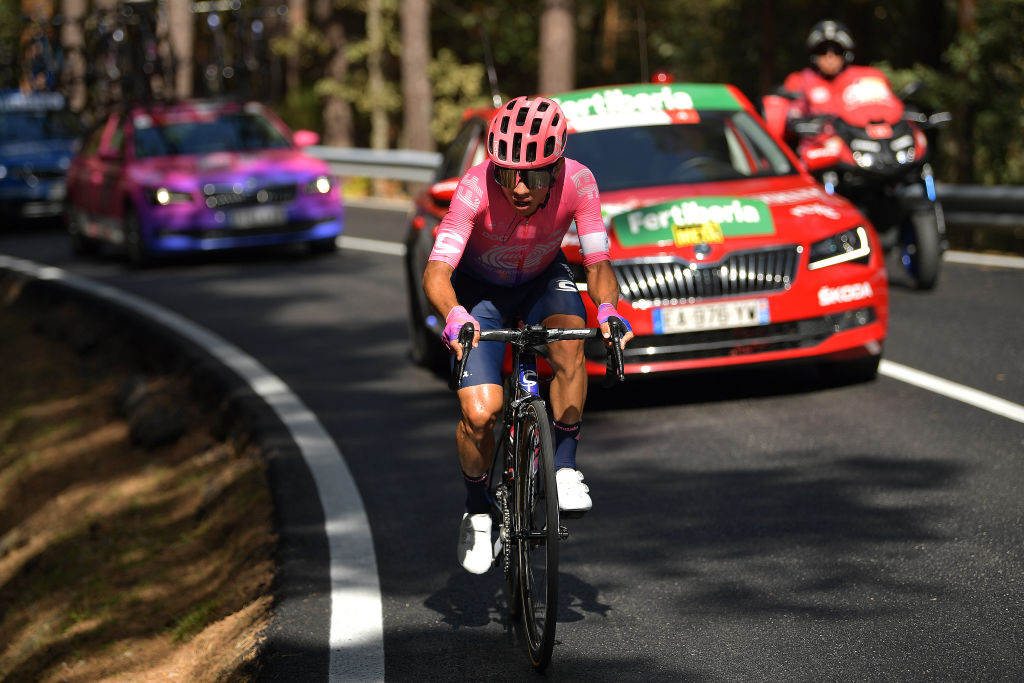
Stage 17 – Štybar tops the bill in the Deceuninck-QuickStep show
The Vuelta a Espana has a tendency to deliver an unexpected and quite brilliant stage, and today's high-speed run between Aranda del Duero and Guadalajara compared well to Fuente Dé in 2012, when Alberto Contador seized the lead, and Formigal in 2016, when Nairo Quintana ambushed Chris Froome on his way to the title.
The Colombian was one of the big beneficiaries again today as he moved up to second on GC having started the stage looking like the red jersey was out of his grasp.
Yet the trigger for a sensational day of racing was provided by the Deceuninck-QuickStep team, who are usually in the thick of the action when the elements threaten to cause havoc. They took full advantage of a strongly gusting wind thanks to Philippe Gilbert's winning the stage as their British climber James Knox moved up to eighth overall.
The Belgian team were ready from the off, gathering near the front of the peloton as it rolled through the neutralized zone from the start, the wind ripping across the open road.
Even though, at 219.5km, this was the longest stage of the race, their blue jerseys hit the front as soon as the start flag was waved, provoking a big split in the bunch, with close to 50 riders ahead of a group twice that size that contained most of the GC contenders.
The only Deceuninck rider to miss out was Max Richeze, and a handful of the Argentinian's seven teammates could justifiably be picked out as the rider of the day.
Rémi Cavagna, Eros Capecchi and Tim Declercq helped to push the break's lead out to six minutes, Štybar, Gilbert and Knox helping out when required, while sprinter Fabio Jakobsen sat in the pack behind them, trying to save his resources. Štybar gets the nod, though, for the way in which he laid the ground for Gilbert's final flourish.
As the race hurtled along at an average of more than 50kph, Deceuninck's chances diminished significantly when the pace proved too much for Jakobsen and he fell back. Double stage-winner Sam Bennett was lurking, and they now had no one to match him in a head-to-head sprint. Or at least that was how it appeared.
On the long drag up to the finish, Štybar powered away, forcing Deceuninck's rivals to chase. Ultimately, Bennett himself had to accelerate across the gap to the Czech. But as the Irishman overhauled Štybar, he had Gilbert on his wheel, and when the canny Belgian accelerated off it the contest was over.
Analysis: Helped by a ferocious tailwind, QuickStep were able to prevent anyone from attacking for the stage win until Štybar made his move inside the final two kilometres. Initially, Subweb chased, but the Czech remained clear.
This forced Sam Bennett to respond himself, but he opened his sprint behind Štybar too soon, making his move from 500 metres out. Although he breezed past the Czech, he had nothing left when Gilbert came off the Irishman's wheel to claim what was a thoroughly deserved success for the Belgian team.

Stage 16 – Fuglsang opens his Grand Tour account
Yesterday Lotto-Jumbo dominated the Vuelta a España proceedings in the mountains, thanks to Sepp Kuss winning the stage and Primož Roglič extending his lead on most of his rivals. Today, at the Alto de La Cubilla, Astana took centre stage as Jakob Fuglsang claimed what was a long-overdue debut win on a Grand Tour stage and teammate Miguel Ángel López moved back within range of a podium finish.
Astana got their tactics right at all points, initially thanks to Luis León Sánchez finding his way into the break and then by Fuglsang joining his teammate among the escapees after bridging up with Thomas De Gendt.
The Astana duo then did no more than hold their place in the large front group, ready and waiting for any move later in the stage by their team leader López, while at the same time preserving their resources for the stage's finale.
When the break reached the 18km final climb, its advantage over the peloton was nine minutes, big enough to guarantee that one of the escapees would triumph. Deceuninck-Quickstep had numbers on their side, three riders working for their young climber James Knox, but it was Astana who made the critical move, Sánchez bursting away, with just four riders including Fuglsang able to follow the powerful Spaniard.
Sánchez drove hard for almost 3km, then Fuglsang darted away with only Trek-Segafredo's Gianluca Brambilla for company. This was a mismatch in mountains of this scale, and when the Dane pushed hard again with 4km left the Italian couldn't stay with him. In his 14th Grand Tour, Fuglsang finally celebrated his first victory.
To cap a great day for the Kazakh team, further down the mountain López capitalized on the work of his teammates to launch a series of stinging attacks that enabled him to close in on the battle for podium places as Alejandro Valverde lost ground.
Analysis: Astana's two riders in the break got their tactics right on the long and not overly steep climb of La Cubilla, initially by letting Deceuninck set the pace on the lower slopes and slim down the front group. With Fuglsang the better climber, Sánchez always looked likely to move first.
But, even though the other riders in the group must have been expecting the Spaniard to attack, he's so consistently strong over a distance that only four could respond, Fuglsang among them. That gave Astana a vital numerical advantage and Fuglsang made sure it paid off.
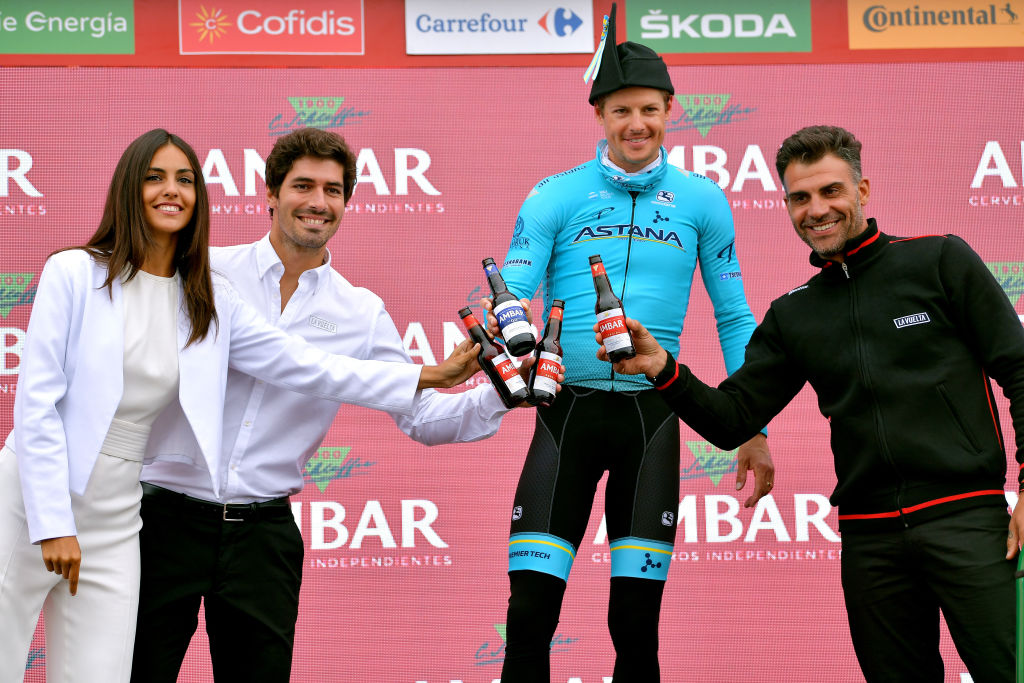
Kuss's win underlines Jumbo-Visma's stranglehold on stage 15
Movistar and Astana went into the first of back-to-back stages in the Asturian mountains insisting they were going to throw everything they had at Jumbo-Visma with the aim of putting race leader Primož Roglič under pressure.
They were as good as their word, but it said a huge deal about the confidence and strength of the Dutch Jumbo team that not only did Roglič extend his lead over all of his rivals except Alejandro Valverde, but the Slovene’s American teammate Sepp Kuss also won the stage 15, his first in a Grand Tour.
Kuss has been fundamental to Roglič’s capture and defence of the red jersey, particularly in the mountains where the early loss of Steven Kruijswijk appeared to leave Jumbo a little vulnerable. Today, he was given the task of tracking early attacks by Movistar and Astana’s mountain domestiques, and tagged along when Astana’s Ion Izagirre jumped away to chase across to a front group that already contained Movistar’s Marc Soler.
As Roglič’s teammate and, therefore, defending the red jersey, Kuss wasn’t obliged to assist with the pace-making in the break and this undoubtedly benefited him on final climb. Prior to that, Euskadi’s Sergio Samitier, who had also moved to the front with Kuss and Izagirre, made a brave attempt to upstage the big names, but his solo bid didn’t ever look likely to go the distance.
The Spaniard reached the final climb first, but at this point Kuss was given the go-ahead to ride for himself, his chase after Samitier giving the first indication that Roglič felt strong and capable of defending his lead. Let off the leash, Kuss breezed past the toiling Samitier and responded quickly when chasing riders threatened his advantage. It was a fine and richly deserved victory, which Kuss celebrated joyfully by high-fiving fans in the final few hundred metres.
Analysis: Sepp Kuss’s victory highlighted the stranglehold Jumbo-Visma currently have on the Vuelta. It was already being said after Roglič bested his rivals at Los Machucos on Friday that the Slovene had one hand on the Vuelta trophy. Although there is still a week of racing to go, that analysis still holds. As for Kuss, his performance on the final climb to the Santuario del Acebo was impressive. When Katusha’s Ruben Guerreiro cut his lead to less than 20 seconds with 4km remaining, it looked like he might get reeled in. But he responded very strongly to the Portuguese rider’s pursuit and quickly pushed his lead out to 40 seconds. The stage was his.
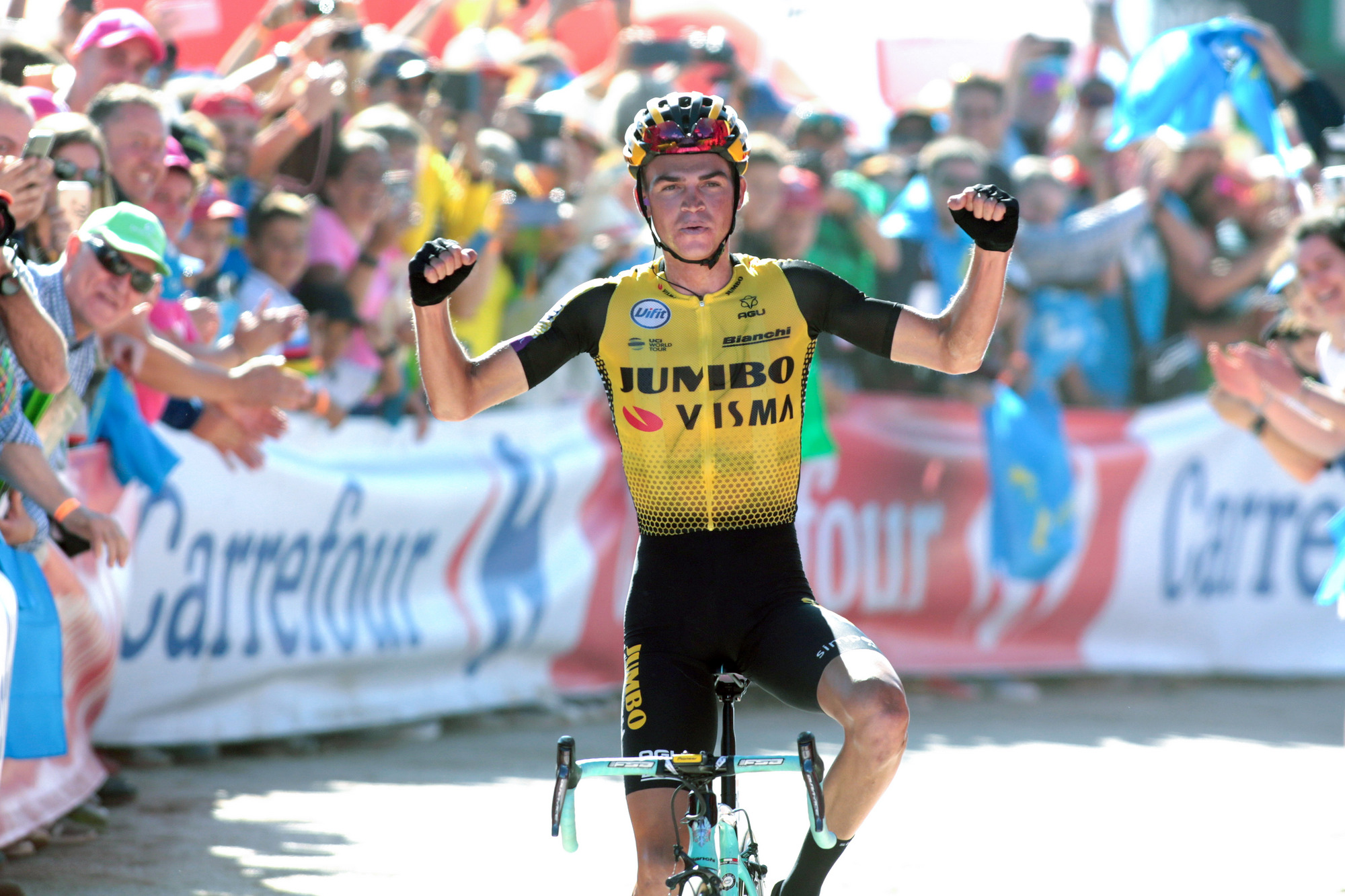
Stage 14 – Bennett in a class of his own
It had been 10 days since the peloton’s sprinters last had a chance to go elbow to elbow at a stage finale and, as a consequence, it was never likely that they would pass up this opportunity for a bunch finish.
Ultimately, Bora-Hansgrohe’s Sam Bennett picked up his second win of the race, although it was an odd one, the Irishman cruising to the easiest of victories after a huge crash at the kilometre banner left little more than a dozen riders at the front. He then celebrated in muted fashion because he wasn’t entirely sure that all of the riders who had been in the break had been caught.
Bennett was no doubt quick to thank his teammates for the work they had done, firstly by assisting with the chase behind the six-man break that stayed clear until just five kilometres from the line.
Despite their persistence, the dogged escapees never managed to push their advantage beyond two and a half minutes. Bora’s black and green colours then came to the front of the line, guiding the Irishman into the final couple of kilometres.
Deceuninck’s Fabio Jakobsen was also well supported, and Bennett’s lead-out man Shane Archbold did well to inveigle his way into their line as they prepared to set the Dutch sprinter up for the finish. Then, with a kilometre to go, a touch of wheels not far down the peloton left most of the riders on the ground.
Deceuninck still looked well set, with Philippe Gilbert and Max Richeze setting the pace for Jakobsen, but as the gradient rose briefly Lotto-Soudal’s Tosh Van de Sande took advantage of the pace slowing and shot away on the left. Richeze reacted, Jakobsen failed to, and Bennett quickly bridged the gap, breezing past the pair ahead of him with ease and looking like a sprinter at the very top of his form.
Analysis: Sam Bennett’s admission that he had no idea whether all of the riders in the break had been caught because he wasn’t anywhere near the front of the peloton until five kilometres from home underlined how well protected Bora-Hansgrohe kept the Irishman today. In the end, he had to react quickly when Tosh Van de Sande accelerated past the line of sprinters with 500 metres left.
Bennett would have been expecting his main rival, Fabio Jakobsen, to react but it was the Dutchman’s lead-out man Max Richeze who chased after and overhauled the Belgian. Bennett was extremely quick to respond and this reaction complemented by his blistering speed won him the stage.
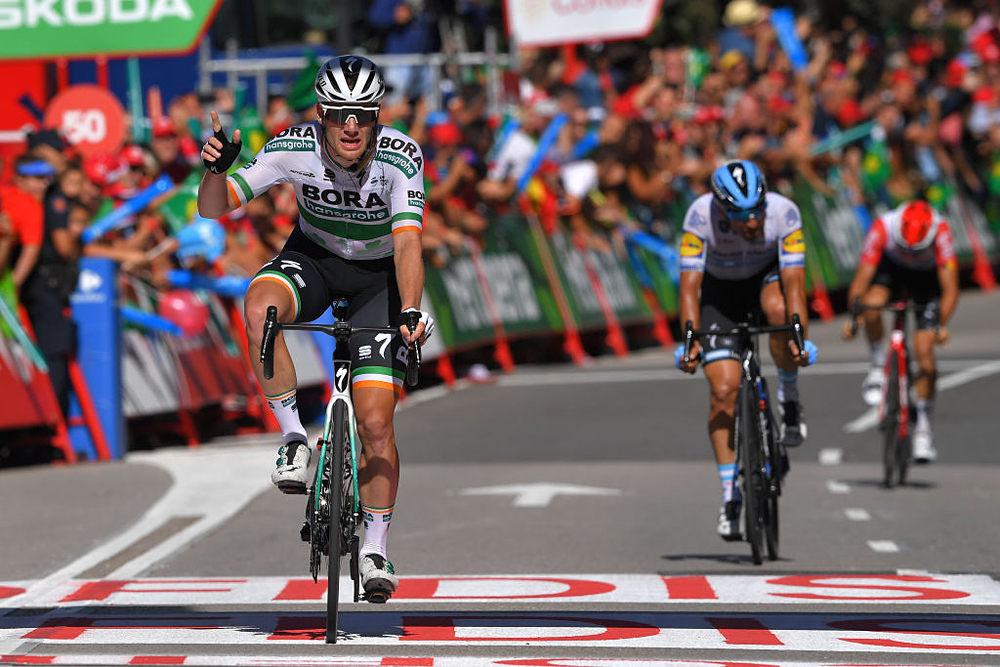
Stage 13 – Roglic’s commanding performance scatters his rivals
The stage to Los Machucos always looked like it would a produce plenty of gripping action, and it didn’t disappoint. The action was almost relentless from start to finish, with several riders producing memorable performances.
In the breakaway group, Héctor Sáez’s 50-kilometre solo raid that resulted in him being the first rider to reach the towering ramps of the final climb underlined the confidence that is now oozing through the Euskadi-Murias team following Mikel Iturria’s stage win two days ago.
When Sáez was overtaken, it was by the unlikely figure of Bruno Armirail, who at 1.90m is hardly a mountain goat and is better known for his time trial ability than his climbing. But what a battling performance he put up.
Armirail yielded to another Frenchman, the more familiar figure of Pierre Latour, whose season is only just getting going after he broke his wrist back in February.
Finally, Bernadette and Brigitte, as he’s christened his right and left leg respectively, are firing on all cylinders and today they carried him to within a few hundred metres of what would have been a hugely impressive victory as the final survivor of the breakaway.
Ultimately, though, Latour and everyone else were upstaged by Slovenia’s Tadej Pogačar and Primoz Roglič, who collaborated to distance their GC rivals. At the line, UAE’s Pogačar took the stage victory, his second major summit win in a few days following his success in Andorra last Sunday.
Yet, Roglič gets the verdict as rider of the day for the way in which he rebuffed all attempts to apply pressure on him and then responded by riding away from his principal rivals when he could see they were struggling. With more than a week to go, the Vuelta isn’t won yet, but Roglič now looks almost impregnable in the leader’s red jersey.
Analysis: Astana have been saying for the last few days that they were determined to apply as much pressure as possible on Primoz Roglič and his Jumbo-Visma team and were as good as their word today. It was their frantic pace-making from 30 kilometres out that thwarted the hopes of the escapees, and they did manage to isolate Roglič from his teammates on the very steep slopes of the final climb.
Yet the Slovene never looked ruffled and then showed he was in complete control when he rode clear of his rivals, compatriot Pogačar the only man able to follow him. Now 2-25 up on second-placed Alejandro Valverde, he is the odds-on favourite to win the Vuelta.

Stage 12 – Domestique Declercq tees up Gilbert
The peloton covered more than 100 kilometres of the Vuelta a España's 12th stage through the Basque Country before a break managed to go clear and stay away, and when that 19-rider group did manage to open a substantial gap Philippe Gilbert was picked out by the bookies and in fan polls as the favourite to win.
Evidently, the Belgian's illustrious palmarès and his strength on punchy roads were a significant factor in that choice, but so too was the presence of his Deceuninck-Quick Step teammate Tim Declercq in the group.
Now 30, the strapping Belgian has never won a pro race, which is quite astonishing given he's been with his highly successful team since 2017.
Yet over that three-year period Declercq has played a crucial role in dozens of victories, and on the road into Bilbao he did a huge amount of spadework to set Gilbert up for his sixth Vuelta stage win.
Initially, Declerq's self-sacrificing role required him to set a fast pace up the first of a trio of third-category climbs on the run-in. However, he was distanced on the second of them as attacks flew up front.
Felix Grossschartner (Bora-Hansgrohe) and Tsgabu Grmay (Mitchelton-Scott) opened up a 45-second advantage that looked like it might be enough of a cushion to enable the pair to contest the stage victory between them.
That was where Declercq really stepped up. Having chased back up to the group that was pursuing the two leaders, the Belgian spent a deal of the time in between the last two climbs hammering along on the front, biting lumps out of Großschartner and Grmay's advantage.
When these two riders turned onto the final ascent of the Alto de Arraiz, Declercq had pulled the chasers up to within a few seconds, and Gilbert was quickly upon them. Within a kilometre, he had powered clear of all of his rivals, the foundations for his victory now laid.
Analysis: Having more than one rider in the break was always likely to pay dividends today, and it's no coincidence that the first three across the line had all had teammates with them. A little like yesterday's stage winner, Mikel Iturria, Großschartner and Grmay gambled that the riders pursuing them would spend too much time looking at each other and not enough focusing on the chase.
Yet Tim Declercq didn't hesitate in setting a blistering pace behind this duo, knowing that in Philippe Gilbert he had a teammate who was very likely to capitalize on this show of selflessness.

Stage 11 – Iturria uses his head and his legs to win on home ground
Having received a wild card invitation to compete in the Vuelta a España, the dream scenario for the Euskadi-Murias team would surely have been a victory in one of the two stages on their home ground in the Basque Country.
That this was achieved was down to an astonishing performance by Mikel Iturria, who drew not only on his tactical nous but on every last physical resource in his body to hold off the riders chasing behind him and triumph at the finale of stage 11 in Urdax-Dantxarinea.
Initially running west across the French Basque Country, this was very much a transition stage destined to be contested by a breakaway group of riders well down the overall classification. There were 14 escapees, who stuck together until the second-category ascent of the Col d'Ispéguy, with 60 kilometres remaining.
Heading up this col, Astana's Gorka Izagirre and Caja Rural's Alex Aranburu appeared the strongest riders in the group, their acceleration splitting it apart. When several riders got back up to them, the pair attacked again over the summit, EF Education First's Lawson Craddock bridging across to them.
Over the next 20 kilometres, eight riders joined this trio, Iturria the last of them, sitting on the back of the little group he'd been in, apparently too exhausted to contribute to their pursuit. Yet five kilometres later, and with 25 still to the finish, the 27-year-old Basque rider jumped clear on his own.
Even when he pushed his lead out to almost a minute with 15km to the line, his effort looked like no more than a brave but fated attempt at glory. On the run-in his advantage dwindled to little more than half a dozen seconds.
Yet no one proved able to bridge that final gap and Iturria held on for an incredible victory, the first of his six-year pro career, all of them spent in Euskadi colours. He couldn't have opened his account in any better place.
Analysis: Although Mikel Iturria's late attack never seemed likely to succeed, he had two things on his side. Firstly, he didn't contest any of the intermediate sprints nor tried to follow fierce attacks on the climbs. Instead, he sat in the wheels, let others do the work and gave the general impression that he was content with simply being in the front group.
Secondly, when he made his move, he committed fully to it, gambling that the riders behind would begin second-guessing each other, enabling him to open a significant lead. As it turned out, his rivals kept looking to each other to reel him in until they reached the final kilometre, and by then it was too late.

Stage 10 – Roglič takes command with time trial win
The red leader's jersey changed hands for the sixth stage in a row, but it looks like it will be staying on the shoulders of Primoz Roglič for quite a few days to come after stage 10.
The Slovene not only won the 36.2km Jurançon to Pau time trial but opened up a gap of almost two minutes on his nearest challenger, Alejandro Valverde. The Jumbo-Visma team leader's performance was undoubtedly the ride of the day.
While the Slovene was the favourite to win this test, his speed and consistency were almost unmatched, with Kiwi Patrick Bevin (CCC) and Frenchman Rémi Cavagna (Deceuninck-Quick Step) the only riders to finish within 30 seconds of him.
Fastest at the two intermediate checkpoints, Roglič never looked likely to falter as he claimed his first Vuelta stage win, a success that means he now has victories at all three Grand Tours.
With so many big mountain stages to come, Roglič needed to give himself a big cushion over his rivals, particularly Colombian climbers Miguel Ángel López and Nairo Quintana. Yet there was no sign that he felt that pressure, and is now clearly the rider to beat.
Analysis: It was interesting to contrast Roglič's consistent ride with the performance of his compatriot Tadej Pogačar. The youngster was second fastest to the first checkpoint, located a third of the way in, but steadily lost ground because he had gone off too fast. Roglic, however, coped well with the varying terrain, gaining time on the hills as well as on the flatter sections.
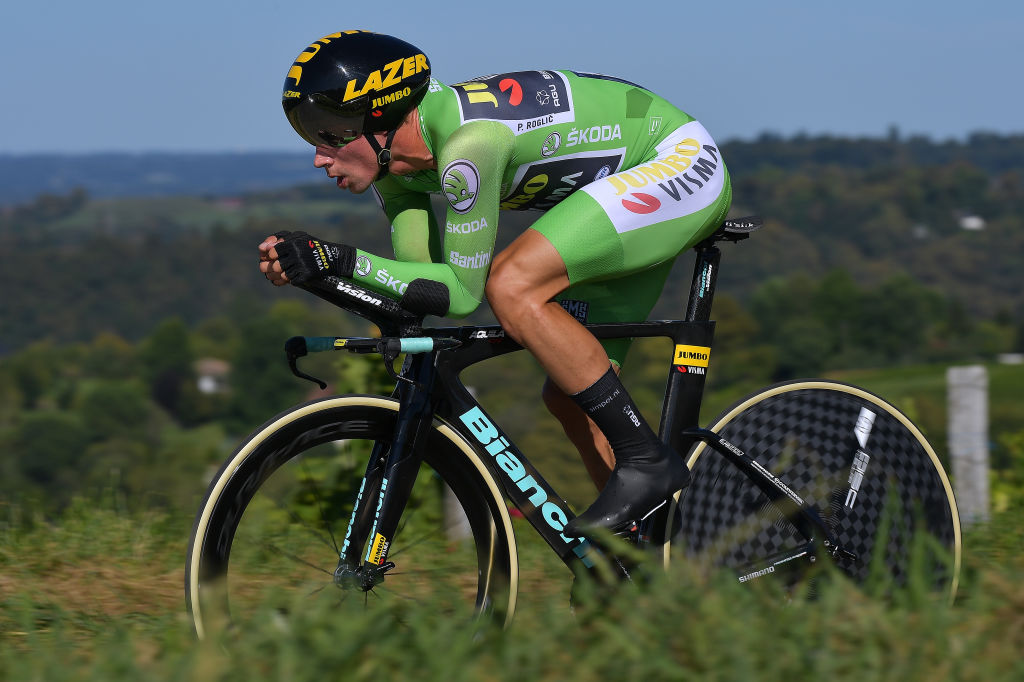
Stage 9 – Pogačar announces himself on the big stage
As this action-packed Vuelta a Espana Andorran stage headed towards its finale, it looked as if Movistar’s Marc Soler would bag the stage victory and be anointed rider of the day.
But then, to the Spaniard’s obvious disappointment, he got a call from his directeur sportif to sacrifice his own chances for the long-term GC prospects of Nairo Quintana, who did end up taking the red jersey from the Vuelta’s latest one-day wonder, Nicolas Edet.
Soler’s loss was, ultimately, Tadej Pogačar’s gain, although the Slovene still had to do plenty when he bridged up to the Spaniard along with Quintana. The 20-year-old UAE Team Emirates rider quickly went to the front of the trio and set a tempo that Soler was able to follow but proved too hot for Quintana.
Soler attempted to pace the Colombian back up to Pogačar’s wheel, but quickly realized that the youngster was going too fast and eased off again for Quintana’s sake.
Three days ago, Pogačar made a big effort to gain time on the GC favourites in the final kilometre up to Ares del Maestrat, but gleaned a mere two seconds on the line as he ran out of gas and was closed down. Had he gone too hard too soon once again?
It quickly became apparent he hadn’t. The race’s youngest rider judged his effort perfectly to claim what will surely be the first of many Grand Tour stage victories, following on from his overall successes in the Tours of the Algarve and California earlier in the season.
Just as impressively, he rode himself right back into battle for the red jersey, jumping four places to fifth. With a time trial to come on Tuesday when he is likely to gain time on three of the four riders ahead of him in the standings, Pogačar could move up again. It really was quite some performance.
Analysis: Pogačar revealed after the stage that the key to his success was the hard pace he set on the dirt road immediately prior to the final haul up to the finish at Cortals. The loss of television pictures due to the weather meant most of the 4km of gravel were lost to viewers at home.
It was evident that the Slovene took full advantage of the conditions, bridging up to Quintana, then tracking him as the Colombian went all out to increase his advantage on his GC rivals. When Pogačar pressed hard again in the final 3km to Cortals, the steady grades suited his powerful climbing style and the stage was won.
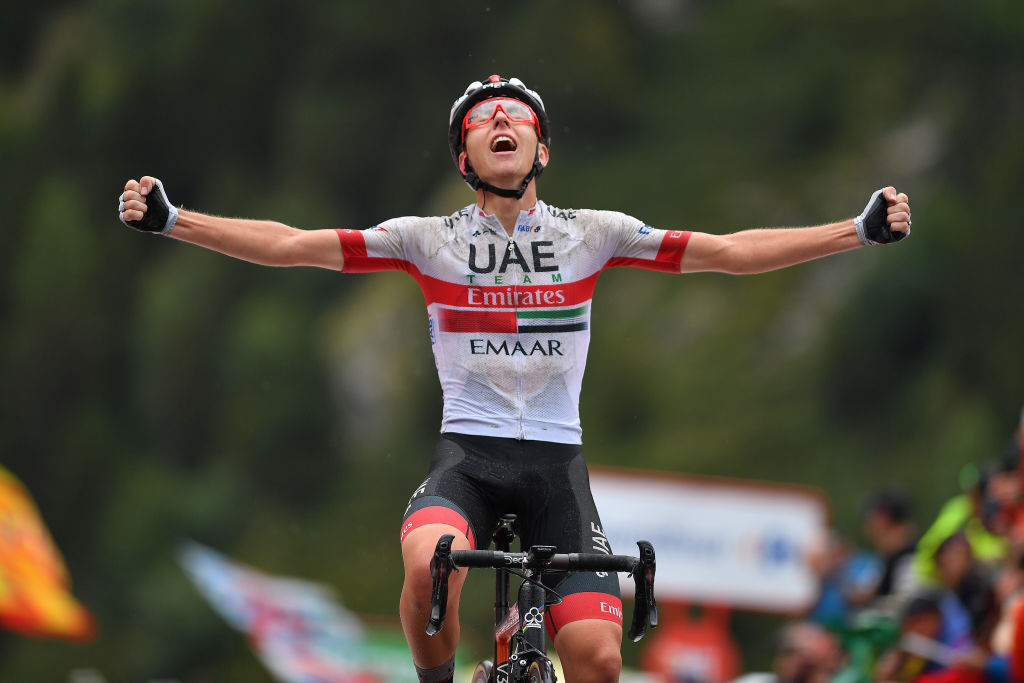
Stage 8 – red jersey a fitting reward for Edet's consistency
For the third time in a week at the 2019 Vuelta a Espana, Miguel Ángel López (Astana) relinquished his hold on the red leader’s jersey after just a single day as the GC favourites decided to take no risks in the wet weather on this stage through Catalunya ahead of a big day in the Andorran mountains tomorrow.
As was the case two days ago when Dylan Teuns (Bahrain-Merida) benefited, a member of the breakaway was the surprise beneficiary of this passivity, in this case Cofidis climber Nicolas Edet, who won the mountains jersey in this race six years ago but has never previously led a Grand Tour.
His capture of the red jersey was a week in the making. The Frenchman who has ridden for Cofidis since turning pro in 2011 came to the Vuelta with his focus on a high overall finish.
Although he’s finished behind the favourites at all of the summit finishes, he’s been close enough to them that he went into today’s stage in 16th place overall, 6-24 down on López. That consistency gave him his opportunity.
While the other riders in the break were more focused on the stage win and rode more aggressively because of that, Edet often kept the break’s momentum going in the hope that his work would pay off for him.
In the end it did, and his capture of the leader’s jersey was a fitting reward for a rider who has so often been close to major successes but has just two pro victories to his credit.
With a lead of three minutes on López, he goes into the short Andorra stage with a decent cushion and has the form to become the rarest of things in this Vuelta, a leader who can stay in red for more than a day.
Analysis: Knowing that Miguel Ángel López and his rivals would be more concerned with the Andorra stage, Cofidis guessed that there was an opportunity for Edet to take the lead.
As it turned out, until the final 20km it looked like he might just be denied, but the rain that drenched the descent off the Puerto de Monserrat played in Edet’s favour as it persuaded the GC hitters to take absolutely no risks. He deserved that bit of fortune, though, for finding his way into the break in the first place and his canny approach once in it.
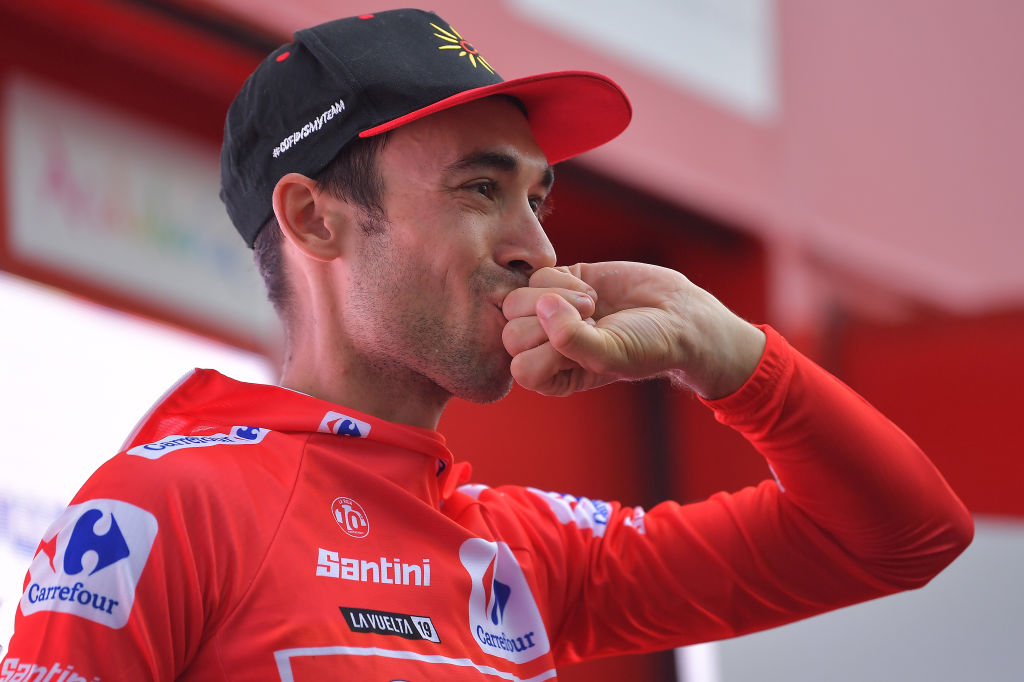
Stage 7 – Quintana plays the key role in Valverde's Mas de la Costa success
Every one of Movistar's line-up could rightly be considered as the rider of the day given the huge contribution each one of them made to world champion Alejandro Valverde's victory on stage 7 of the Vuelta a Espana.
Nairo Quintana gets the verdict because his tactics on the steep final ascent of the Alto Mas de la Costa were absolutely crucial to Valverde's success, which also resulted in the Spanish team having two riders very much in contention for the overall title.
For a considerable part of the stage, it looked as if it might unfold in a similar way to the previous two, a break going clear and the peloton opting not to chase.
Yet Movistar's decision to set a fast pace in the bunch from almost 50 kilometres out changed the whole perspective. Race leader Dylan Teuns was the most significant casualty of their desire to set up Valverde for his 13th Vuelta stage win, the Belgian losing contact with 25km left.
Though Philippe Gilbert (Deceuninck-Quick Step) and Sergio Henao (UAE Emirates) made a valiant attempt to extend their raid to the finish, it was clear well before the brutally abrupt 4km final ascent that they weren't going to make it.
It then appeared the finale would see a duel between Jumbo-Visma and Astana, who were both well represented. But Quintana's attack with 3.2km left scattered the mountain domestiques and left the Vuelta's strongest quartet to fight it out.
The final three kilometres were enthralling, even though in the end Valverde's winning was very predictable. His success underlined that Movistar had got their tactics spot on. With two cards to play on GC, it will be interesting to see how they approach the next big stage in Andorra on Sunday.
Analysis: Often ridiculed for their tactics and their repeated failures to sustain a GC challenge in Grand Tours despite – or because of – the number and quality of their leaders, Movistar got it right today.
On the final climb, Quintana accelerated at least four times, but when, on each occasion, he failed to make a decisive break, he eased off, knowing that Valverde's speed at the finish would make him an almost certain winner at the summit. He wasn't selfless, but he was sensible, and in the end that approach paid off.

Stage 6 – Teuns seizes the day and claims the red jersey in Ares del Maestrat
For the second day in a row, the peloton opted not to chase down the break of the day and the stage victory went to one of the four Pro Continental teams in the race, as Cofidis’s Jesús Herrada claimed his first Grand Tour success, compensating for his elder brother José’s defeat to Burgos-BH duo Madrazo and Bol 24 hours earlier.
However, on this occasion the bunch’s decision not to commit also resulted in the red jersey changing hands, Bahrain’s Dylan Teuns moving into the lead as a result of finishing second on the stage, almost six minutes ahead of Miguel Ángel López, who for the second time this week was knocked out of first place after just one day.
When it became clear that López and his Astana team were happy to let the jersey go and relinquish the pressure of defending it, Ineos’s David de la Cruz looked the favourite to inherit it as the highest placed rider in the break, especially as the punchy finish at Ares del Maestrat would normally have suited him very well.
But the Spaniard has looked some distance below his best since the Vuelta got under way, and his 11-second advantage over Teuns never looked likely to be enough once the Belgian made his attack four kilometres from the finish.
For Teuns, this was a third big success in as many months. Winner of the second stage of the Critérium du Dauphiné in June, the Bahrain-Merida rider bagged the biggest win of his career in July at the Tour de France when he outlasted Giulio Ciccone at La Planche des Belles Filles. Very talented and racing on a wave of confidence, he is now leading a Grand Tour for the first time.
Analysis: Once Astana eased off with its front-of-the-peloton pace-making to allow a rider in the breakaway to move into the red jersey, David de la Cruz and Dylan Teuns were best placed to benefit. The pair appeared well matched and were clearly keeping a close watch on each other coming onto the final climb, with 6km to the line.
Teuns needed to gain 11 seconds, and made a strong attack to test out his Ineos rival with 3.9km to the line, too strong as it turned out for De la Cruz. With one swoop, the contest was over.

Stage 5 – Madrazo leads in the stars
Teams that gain a wild card selection to big races like the Vuelta a Espana always want to prove that they are worthy of their place, and Burgos-BH did that in the best fashion on the Vuelta’s new summit at the Observatorio Astrofísico de Javalambre, outshining the race’s major stars with a 1-2 finish thanks to rider of the day Ángel Madrazo and teammate Jetse Bol.
Burgos began the day determined to defend Madrazo’s lead in the mountains competition, Dutchman Bol joining his experienced Spanish teammate in the break along with José Herrada of Cofidis. Madrazo in the blue polka-dot jersey and Bol in Burgos’s unmistakable purple colours fulfilled this task perfectly, cleaning up the points on the climbs to consolidate Madrazo’s lead.
As none of the three escapees were any threat to the leader’s jersey, the peloton’s big guns, led by Nicolas Roche's Team Sunweb, weren’t concerned with chasing them down. When with little than 20 kilometres remaining their lead was still close to 10 minutes, it became clear that they were away for good and that the stage win would go to one of the trio.
On the steep ramps of the final climb, Madrazo attacked once, got dropped four times, but fought back on each occasion, the last time clawing his way up to Bol and Herrada as they reached the final kilometre. Bol had, meanwhile, let Herrada set the pace, occasionally coming through, but for the most part glued to the Cofidis rider’s back wheel.
Herrada’s tactic of riding on the front suggested he was the strongest, but ultimately numbers told. Madrazo, who rode with Herrada for two years at Movistar, perhaps knew that his acceleration on the climbs would make the difference at the end. When he delivered it, Herrada certainly had no answer, and Burgos-BH had a famous win, Bol’s second place making it even more memorable.
Analysis: Madrazo, Bol and Herrada’s attack appeared to a typical kamikaze raid, the two Burgos-BH riders essentially focused on keeping the mountains jersey on Madrazo’s shoulders. Yet, once their lead reached and, crucially, stayed at more than 10 minutes, they realized the stage win was at stake.
Although Madrazo was dropped several times, and was at one point almost knocked off his bike by his own team car, he kept making his way back because Herrada just couldn’t shake Bol. With two against one in the final kilometre, the Burgos pair played their tactics perfectly, Madrazo attacking, Bol tracking, Herrada beaten.

Stage 4 – Jakobsen seals a superb team effort with his first Grand Tour success
Deceuninck-QuickStep have come to the Vuelta a Espana with stage wins as their priority and substantial hope vested in Dutch champion Fabio Jakobsen for the bunch sprints, and he takes today’s honour having just managed to hold off Sam Bennett in El Puig to cap off a superb team performance.
His teammates played a vital role in his success, firstly by pacing him back to the bunch after he had been distanced on the day’s only categorised climb. Once the young Dutchman was safely back in the peloton, Tom Declercq set about chasing down the two-man break of Jelle Wallays (Lotto-Soudal) and Jorge Cubero (Burgos-BH).
Coming into the final 6km, Rémi Cavagna went to the front, ostensibly to set the pace for Jakobsen, but the Frenchman got a gap and took full advantage of it, giving all he had for the next 4km, forcing Bennett’s Bora-Hansgrohe team to commit vital resources to reel him in. Crucially, this chase cost Bennett his key lead-out man, Shane Archbold.
While Bennett had to negotiate his own way in the sprint, Jakobsen got the perfect lead-out from Zdenek Stybar and Max Richeze. He then just enough speed to make sure all that teamwork paid off.
"We did a perfect lead-out. When it was my time I went, and we went full for the line," said Jakobsen. "I threw the bike for the line and couldn’t see [who won] because I closed my eyes and Sam was close to me. I knew when I saw the guys from the team cheering."
Analysis: Jakobsen wasn’t the fastest in the sprint, but, set up perfectly by his teammates, he didn’t make any mistakes and, ultimately, that gave him the winning edge over Sam Bennett. It was impressive way to take his first Grand Tour victory and give himself an early present for his 23rd birthday, which falls on Saturday.
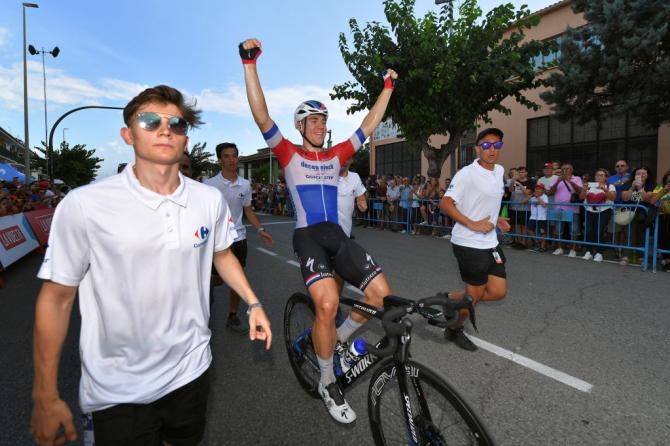
Stage 3 – Bennett eases to victory in the sprint
On a nailed-on sprint stage of the Vuelta a Espana where, let's be frank, there wasn't a whole lot of action, there was only ever going to be one winner of stage 3's rider of the day. Sam Bennett (Bora-Hansgrohe) takes the honours today for a flawless sprint in Alicante.
The Irishman took his fourth Grand Tour stage win and first at his debut Vuelta, winning by two clear bike lengths from the next-fastest man, Edward Theuns (Trek-Segafredo).
After strong work by his team in the closing kilometres, Bennett jumped on the back of the Trek train in the final metres, starting his sprint 150 metres from the line, just as Theuns' lead out man John Degenkolb peeled off.
What followed was an unmatchable display of power, as the 28-year-old eased to victory number 12 in 2019.
"After last week [at the BinckBank Tour] people expected this, and that brings extra pressure," said Bennett after the finish. "And there was pressure from myself, which is the worst kind of pressure."
As he went on to say, the pressure is off now. Bennett has his victory and he'll be the favourite for more, starting with tomorrow's flat stage 4.
Analysis: It has been a great opening to the Vuelta for Ireland. The country has two men on the start list and already have the red jersey and a stage win. Bennett becomes the sixth Irishman to win a stage at the Vuelta after Shay Elliott, Sean Kelly, Philip Deignan, Dan Martin and Nicolas Roche. Roche is also the first Irishman to lead the race since Kelly back in 1988.
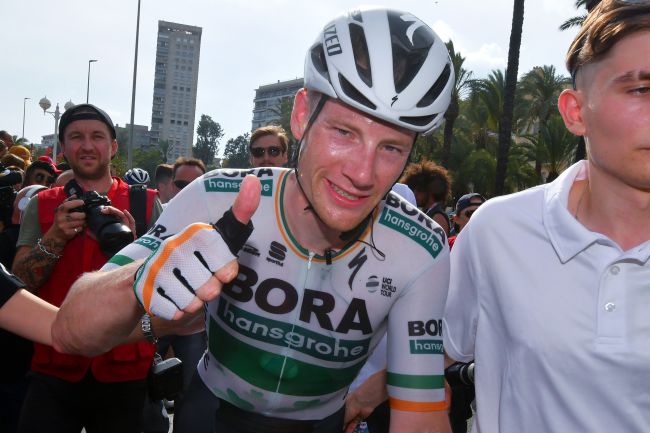
Stage 2 - Armée rides with heart
Under most circumstances, the stage 2 award would go to Nairo Quintana (Movistar) for his impressive stage win, or even Nicolas Roche, who rolled back the years and put in a canny performance to assume the Vuelta a Espana leadership after two days.
However, the Monster rider of the day award goes to an athlete who finished 115th on the stage, Sander Armée.
The Belgian and his Lotto Soudal teammates led a minute's silence at the start of the day to commemorate Bjorg Lambrecht, who tragically lost his life in a crash at the Tour de Pologne earlier this summer. The last few weeks have been unsurprisingly and understandably difficult for the Lotto Soudal team but through it all, they have raced with pride and dignity as they look to honour the memory of the late 22-year-old.
Armée epitomized that spirit with his ride on stage 2. He helped force the early break and then, even with the peloton breathing down his neck, still attacked solo with 39km to go and held off the charge for another 8km of racing.
It was a futile late move from Armée but that was beside the point. If he couldn't win the race then he would at least give it everything for the cause.
Analysis: Quintana's move was special and Roche's dogged ride was a timely reminder that he can still ride with the best in the world on his day but the award of rider of the day has to go to Armée. The Belgian won a stage at the Vuelta two years ago but today, when the bunch was closing in, wasn't about winning. It was simply about paying respects and putting in a ride that would have made Lambrecht proud.
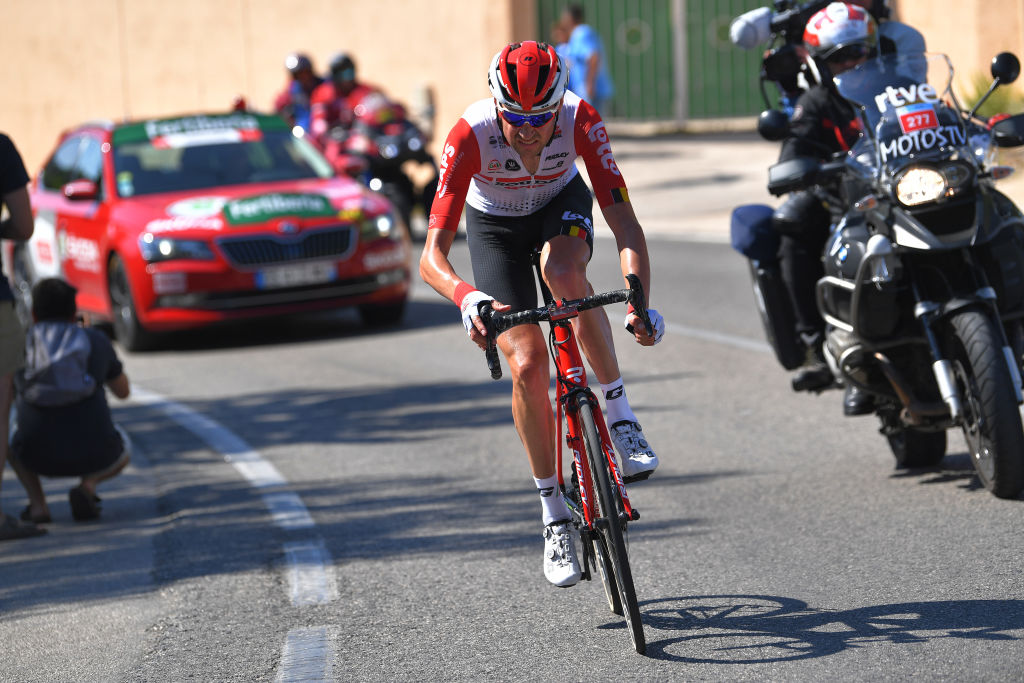
Stage 1 - López superb in opening team time trial
There were few realistic options to choose from but anyone of the Astana riders could have been selected given that this was a team effort. However, Miguel Ángel López is the Cyclingnews Monster rider of the day for the simple reason that he crossed line first and pulled on the leader's jersey at the end of the team trial on stage 1 of the Vuelta a Espana.
Success in Grand Tour racing is based upon execution and there was little to fault Astana over their ride in the 13.4km course. Fastest at the first time check by a massive six seconds and then dominant all the way to the line, they made use of their significant horsepower with arguably a stronger team than they had at the Tour de France in July.
If execution of performance is important then so too is momentum. This is only stage 1 and the time gaps to the majority of their rivals - Jumbo-Visma aside – are relatively small but the confidence gained from an early win will filter through the Astana ranks tonight and last for a number of days.
For López, who led the team home and looked comfortable doing so, this is an important marker. He now has a buffer on several key rivals and the two-time podium finisher in Grand Tours clearly has the form to contend the leader's jersey all the way to Madrid.
The question at the dinner table this evening will be whether Astana decide to relinquish the leader's jersey over the next few days. Sunday's stage should end in a sprint but there are key stages dotted inside the first week that will have a detrimental effect on the GC battle in this year's race.
Analysis: It's early days at the Vuelta but already we've been provided with a possible glimpse of what's to come. Astana and Sunweb will come away from the stage with their confidence boosted but for the likes of Movistar, Mitchelton and especially Jumbo Visma this was a bruising encounter.
Astana and Lopez looked untouchable with the Colombian certainly one of the main favourites for the race. The race has only begun but this was a major marker for Astana and their leader.
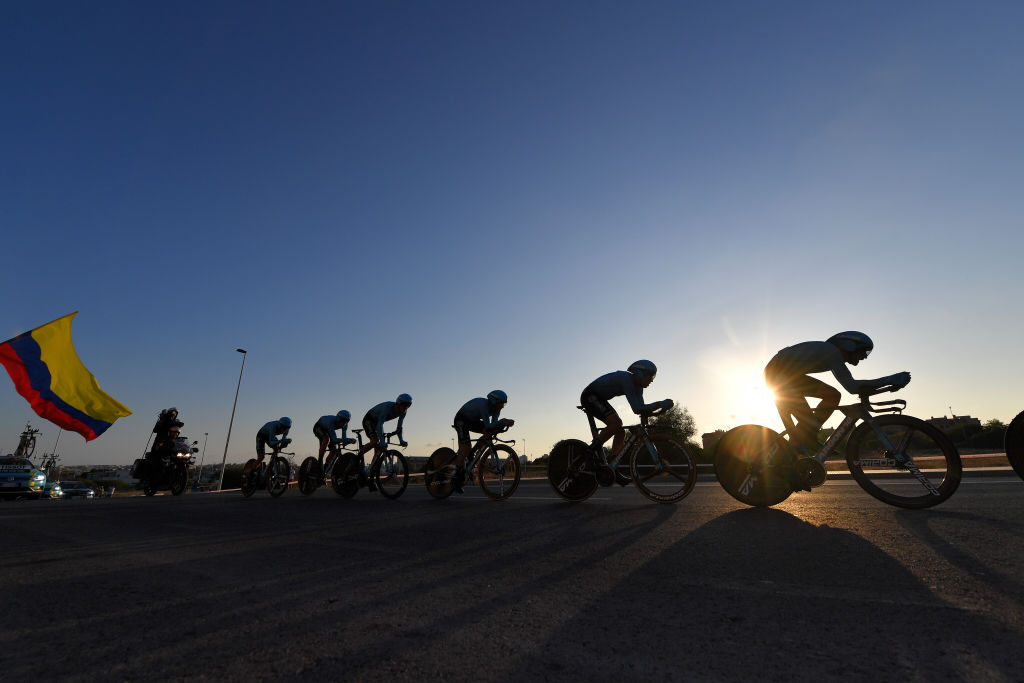
Cyclingnews is the world's leader in English-language coverage of professional cycling. Started in 1995 by University of Newcastle professor Bill Mitchell, the site was one of the first to provide breaking news and results over the internet in English. The site was purchased by Knapp Communications in 1999, and owner Gerard Knapp built it into the definitive voice of pro cycling. Since then, major publishing house Future PLC has owned the site and expanded it to include top features, news, results, photos and tech reporting. The site continues to be the most comprehensive and authoritative English voice in professional cycling.